Music Reviews
SUMMER BEANO - FEATURING NOJOKE - Serpentine Community Garden

It has been said that Buxton’s Serpentine Community Garden grows people as well as plants and this event certainly gave truth to that. Despite rain quite a few people, including families, young people and retired turned out to hear two local music groups perform in a polytunnel. Most people also took the opportunity to tour the gardens which are looking fabulous at this time of year vibrantly demonstrating the variety of foods that can be grown right here in Derbyshire. Mocktails were on offer (for donations) and the atmosphere was easy and generous.
NoJoKe (Norman, Joel & Keith) played an impressive array of guitars and ukuleles for songs like ‘Perfect’, ‘Wake Up Little Suzie’ and ‘Nobody But You’. A penny whistle made an appearance and the audience willingly sang along for the chorus on one or two songs. The musicians clearly enjoyed playing together and their pleasure came through the playing causing feet to tap and smiles all round.
Shortcomings, is a ladies barbershop quartet, or acapella singing group of four women who wove their voices together really well in a quite varied repertoire including ‘Make your Own Kind of Music’, ‘Sandman’, and a sea chanty.
Both groups of musicians make music for the joy of it and brought their joy to the Serpentine Community Garden for a lovely gentle community event on this final day of Buxton Festival Fringe. We are so blessed to have a community of people here in Buxton who are willing to make the effort to create gardens, music and more to nourish our bodies and our souls.
Jean Ball
CLOSE ENOUGH AT THE PUMP ROOM - Close Enough Barbershop Quartet
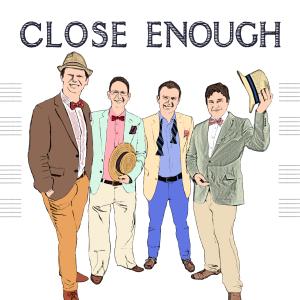
We have had such a choice of music at this years Fringe: classical song, Brass band, Orchestral, Guitar, the list goes on. Into this rich mix we have the welcome return of last year’s Buxton Fringe Music Award winners ‘Close Enough’.
Billed as a close harmony Barber-shop-quartet style group it was a little surprising to hear a song from the Jungle Book and Hello Dolly. There was also Tom Lehrer’s “Masochism Tango”, all of which I think gives a flavour of how varied and fun the show was. The audience was recruited for ‘Waltzing Matilda’ and joined in enthusiastically. Of course we had the old standard crowd pleasers: ‘Mr Sandman’, ‘Loch Lomond’ and ‘Trolley Bus’.
The group shared the lead in several songs and related well and humorously with the full-house audience while the acoustics in the Pump House added atmosphere to the excellent songs.
There was only one performance but let’s hope they will return again next year.
Brian Kirman
CITY OF MANCHESTER PRESENTS A RIGHT ROYAL REVELRY - City of Manchester Opera
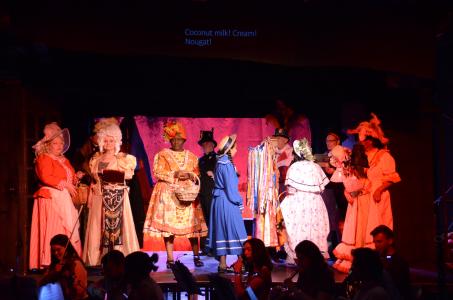
A real treat for the last Saturday night of the Fringe, this 15-strong choir performed a concert of opera favourites featuring kings, queens and other royals in honour of this coronation year.
The group’s Spanish conductor Juan Ortuño served as our guide introducing works by Verdi, Berlioz, Purcell, Mozart, Donizetti and others. While the choir itself produced a great sound in the fantastic acoustic of the Methodist Church, it was particularly exciting when individuals stepped out to have their moment in the limelight performing solos and duets. There was no programme and performers were barely introduced but it was amazing how many beautiful voices emerged - I loved John as the Roman emperor in Mozart’s La Clemenza di Tito, his lovely light voice flying round the church, or Margaret producing such a rich sound for Donizetti’s Maria Stuarda, but I could also have mentioned the emotional performance of Dido’s Lament from Purcell’s Dido and Aeneas or that of Princess Eboli cursing her own beauty in Verdi's Don Carlos.
With such talent on display plus assured direction from their conductor and spirited piano from Jonathan Ellis (an acclaimed and familiar figure on the Fringe), these singers could afford to look more confident at times. It was great to see them really relax at the end for a fun scene from Gilbert and Sullivan’s The Gondoliers and, to finish off, Verdi’s triumphal march from Aida.
At the end I felt full of questions - who were they all? - and had a chat with the conductor who explained that the group is open to all those wishing to gain experience of opera. All that was needed was a musical ear and anyone could learn to be an opera singer. The current membership includes people of various ages and with very different musical backgrounds.
Events like these serve to bring opera to people for whom it might seem inaccessible. I look forward to the group's return and many more nights of revelry, royal or otherwise, from the City of Manchester Opera.
Stephanie Billen
PIANO POSTCARDS - Adrian Lord
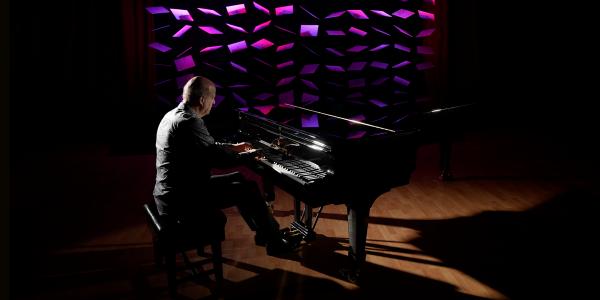
Adrian Lord, on his 5 or 6th visit to the Buxton Fringe (he could not quite remember how many it had been!) covered a range of original piano compositions from his 4 albums. The main part of the concert covered the pieces from his recent album, 'Piano Postcards', with highlights from his earlier albums played towards the end. Mr Lord regularly engages with his audience between pieces, and his personable style and explanations of the inspiration for each piece added considerably to the experience. He takes his audience on a journey from the parks of his youth, through bluebell woods and train journeys to the wilds of the Lake District and Scotland. A very pleasant way to spend time, and for those who want to continue the experience, sheet music and CDs were available afterwards, as was the chance to speak to Mr Lord, who was as friendly and engaging off stage as on. The ink illustrations for his CDs are included in the sheet music for sale, which is a lovely touch.
The United Reform Church was a pleasant setting with great acoustics and the newly restored grand piano certainly sounded top notch. A lovely way to spend some time on a rainy afternoon, and deserving of a much bigger audience than had ventured out in the quite abysmal weather.
Julie Eastdown
SIMPLY A CAPPELLA - Ordsall A Cappella Singers
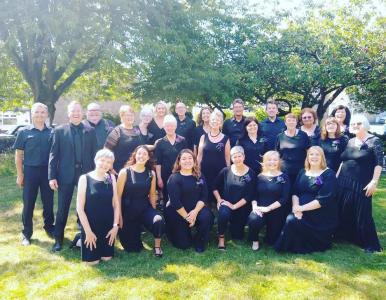
The Ordsall A Capella Singers, based in Salford, have been singing together for nearly 25 years and coming to Buxton Fringe for 13. They perform across the north west and enjoy coming over the hills into the Midlands as their southern most concert and a high point in their year.
The combined sound of two dozen voices singing in glorious harmonies filled the United Reformed Church with rich rolling textured sounds. They sang entirely from memory and a few of the singers had a solo part in some songs. They started with a lovely rendition of ‘This is why we sing, why we lift our voices’ and the joy could been seen on the choristers faces as well as heard. ‘Colour of the Wind’ was particularly effective with each of the voice types coming through clearly and blending beautifully in a celebration of nature.
The choir has grown, with eight new members since returning to face to face rehearsals after a pause during the pandemic. They are only in town for one day and are doing a second performance of the same programme in St Mary’s Church at 3pm today. If you miss them this year make a note to keep an eye out for their return in 2024.
Jean Ball
DEAD SET DANCE - Isaac Neilson

This was not the usual performance of songs by a band, but an introduction to the song writing process. Isaac Neilson is a talented young musician from Buxton, who has started writing his own songs after many years of performing covers. Isaac who played acoustic guitar and piano was joined on the stage by Damo Webster on percussion and Joe Thorogood on bass guitar. Isaac’s usual rhythm guitarist and producer, Matt Taylor, instead took up the dual roles of operating the mixing desk and interviewing Isaac about his song writing. The interview technique worked really well, Matt asking Isaac questions about each song which the band performed live. The 6 songs discussed were Dead Set Dance, Hanging of a Spike, Tear this Down, Flying, Sail Away and Save Me. A work in progress song Running Back was performed as an encore.
Dead Set Dance was about some of the joys and pitfalls of the club culture. The song had a great starting rift; later Isaac and Joe did some great solos on guitar and bass respectively. Like most of Isaac’s songs there is an autobiographical element. Isaac tells stories in his songs, in this case with one character in the situation and a narrator describing the scene. Hanging of a Spike was about the effects of having a drink spiked. Luckily Isaac was in a safe place when it happened to him, but he sang about what might have been. The song was rewritten, changing from major to minor and introducing a stifled chorus indicating the lack of control. Tear this Down is Isaac’s best performing song on Spotify. It is the story of the breakdown and ending of a relationship. Extra verses were added as the relationship altered through time. There were dark lyrics but uplifting upbeat music.
Isaac performed the next 2 songs on the piano, still accompanied by Damo and Joe. The change in instrument introduced variety to the songs. Flying was about escaping a situation and taking up a new life. There were sad suicidal elements to the words and an uplifting tune. Sail Away started off a guitar rift that was transposed for the piano. It showed off Isaac skills as a blues pianist. Returning to the guitar, Isaac sang Save Me which was again about a relationship. Here the chord order was changed as the song progressed to indicate mood changes. Isaac found performing songs live with a band, a good way to improve songs for recording purposes. The encore had the working title Running Back which was a happy number. The music performed was excellent and there was the added interest in hearing about the creative song writing process.
John Hare
You can hear Isaac Neilson on the following:
Facebook & Spotify: Isaac Neilson
Instagram: @isaacneilson00
Website: www.isaacneilson.co.uk
AS I WALKED OUT... - ARKangel
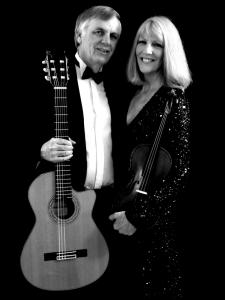
Down in the Pump Room last night were ARKangel who have developed a reputation at Buxton Fringe for interestingly themed shows combining music and spoken word. And this time it was their take on Laurie Lee’s second volume of memoirs, As I Walked Out One Midsummer’s Morning.
Venturing away from his home in the Cotswolds for the first time, Lee sets out to see the blue sea, and on to the teeming metropolis of London. Early in the show this made for a mixture of English folk music alongside the Spanish music that came to dominate.
Going to Spain wasn’t in Lee’s original plans, but he ended up spending most of his money on a ticket for the boat and set off walking across Spain, relying on busking with his father’s old violin to earn some cash – not so easy in a poverty-stricken country. Using instruments associated with Lee, Katherine plays the violin, and Spain, Alan plays the guitar, ARKangel created the atmosphere that we associate with the book.
In between the songs, Catherine tells the story of As I Walked Out in an excellent precis of the book with some direct quotes. Switching to her direct experience of Spain as a young teen, Catherine really brings the story to life, particularly her description of a farm she stayed at that was very similar to Lee’s experiences.
Eventually the Spanish Civil War impinges directly on Lee, as he holes up in a fishing village in Andalucia, and Catherine poignantly links the drama of a raid on a nearby village with the story of her friends recently discovering a mass Civil War grave on their farm in Spain.
Lee’s text is deftly interwoven with instrumentals and songs from Manuel de Falla and Rodrigo, and traditional Andalusian song with the poetry of Lorca. Overshadowed by the Second World War, it is important to remember this harbinger of what was to come to the rest of Europe and the men like Lee who saw that and fought fascism.
Very well done to ARKangel for this fascinating performance. Even the trickling water in the Pump Room was evoked as a reminder of the water running through Granada.
Stephen Walker
PETER AND THE WOLF - ADVENTURES IN MUSIC AND ART! - Sheffield Music Academy and Friends
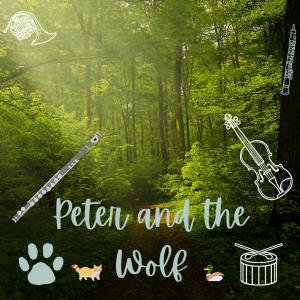
There are many benefits to getting old. One is seeing young people grow and blossom over the years. So it is that the 4 year old Henri who helped me dig up a floor in Bakewell nearly 30 years ago is now a beautiful young woman, consummate musician and indefatigable organiser of concerts like this one. Friends of Green Man Gallery will be familiar with her series of concerts there celebrating the links between the musical and visual arts.
In this concert the star attraction is Prokoviev’s Peter and the Wolf but in the first half we were treated to increasing numbers of young musicians providing aperitifs. Solo violin Gina Hindle opened with Bach’s Partita in E major, delivered with breathtaking speed and dexterity. She was then joined by Simon Peng, violin and our Henri (Hill), viola to give us parts 1 and 3 of Dvorák’s Terzetto Op. 74. After this Gina took a well-earned rest and Henri was joined by Adah Charles, clarinet, James Hindle, cello, Olivia Scheepers and Fiona Robertson, violins to perform the allegro from Mozart’s Clarinet Quintet.
The standard throughout was remarkably high and the audience very appreciative.
After the interval came Peter! This was done exactly as it should be. The audience were engaged, particularly the young people at whom it is aimed who answered questions with glee and offered their own observations. Each character was introduced in turn by Martin Cropper – music director of SMA – and the players demonstrated each theme and explained how their instrument worked to the delight of the young people. Abdullah Al Rammahi was the bird, playing Flute (Abdullah is also a pianist, singer and soon-to-be medical student – I know, not fair). The duck was Rebecca Taylor on Oboe, Adah Charles returned on Clarinet to be the cat. The lovely Bassoon of Emma Crooks personated the grandfather, Simon Twigge’s Horn gave us the wolf. Peter was played by all of the strings above plus Amelia Awan as an extra violin. Martin narrated and somewhere behind us was an invisible (and anonymous) Tympanist.
The whole was an immense success, beautifully performed and engrossing all, especially the young ones. We need more of such music-making to engage the next generation of listeners, and perhaps performers? Music is a great gift and we must value people like Henri who bring it to us.
Henri performs in Bakewell Town Hall tonight (July 20th) with the Bellinfante Quartet celebrating Henry Purcell.
John Wilson
PARTITA - RENAISSANCE AND BAROQUE MUSIC - Partita
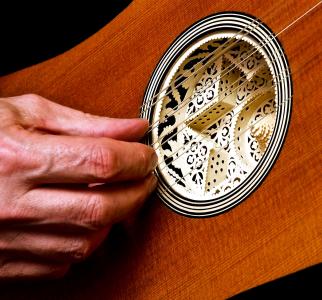
This was not Partita's first time at Buxton Festival Fringe. Their free lunchtime concert drew a packed audience, both new and old.
Partita is an ensemble made up of four professional musicians - Sasha Johnson Manning, Holly Marland, Jill Lingard, and Roger Child. They specialise in performing songs from the 12th to 18th century.
The rich and varied programme was broken down into sections focussing on the music's origins or, the type of music being played. Sections included Elizabethan Wonders and Joy and Sorrow in Renaissance France and Spain. Each musician is an expert in their craft. The pieces played showcase their skill with a variety of instruments including lute, harpsichord, recorder, baroque guitar, and kora.
Sasha Johnson Manning and Holly Marland provide accompanying vocals which are just sublime and lend each piece an otherworldly quality. You are transported to another time and place.
It is almost impossible to pick out one piece over another, but I particularly enjoyed hearing the Kora played by Holly Marland. The Kora is a stringed instrument that originates in Africa. Holly was taught the instrument by a Master in Gambia and played a beautiful piece that described the strength and bravery of a warrior. She also played a Ukrainian folk song in recognition of the cause for which they were accepting donations and a traditional Roma folk piece, before finishing with another piece from Africa.
Each piece the ensemble played was introduced by either the musician themselves or Sarah Lucas, the narrator. This gave the audience some background and helped deepen our understanding.
The whole concert was joyous, and I would definitely recommend attending next time they appear at the Fringe. You won’t be disappointed.
April Irwin
FOR ONE NIGHT ONLY - Chapel-en-le-Frith Ladies Choir
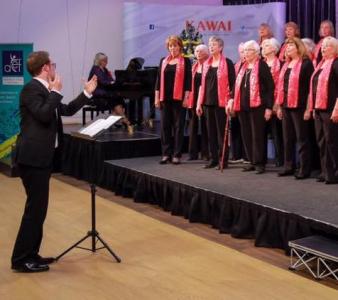
This concert was a delight from start to finish and was deservedly completely sold-out.
The breadth of the Ladies’ repertoire went from William Cornish’s ‘Ah Robin’, a 15th Century a cappella round to Belinda Carlisle’s 1987 hit ‘Heaven is a Place on Earth’, taking in an African-American spiritual and a Xhosa hymn. How could this not be impressive? Combined with the choir’s enthusiasm, clarity, and their camaraderie and tasteful Summer corsages, the event was thoroughly enjoyable.
The concert opened with the powerful spiritual ‘Down in the River to Pray’ where the choir were joined by guest soprano Alicia Hill. Alicia and her accompanist, Jack Smith, later gave us two Puccini arias and several standards from the jazz songbook including a majestic interpretation of ‘Summertime’ which made the hairs stand up on the back of this reviewer’s neck.
In fact, ‘Down in the River to Pray’ seemed to establish water as a theme of the concert, with the opening number being followed at various points by ‘Cry Me a River’, ‘How Deep is the Ocean’, ‘The Seal Lullaby’ and ’Let the River Run’. How appropriate for a Fringe Festival in a town famous for its water?
The rapport between the choir and their Musical Director, Sam Gilliat and Accompanist, Jane Simmons, was palpable. Sam provided solo contributions of ‘Run Away’ by Ben Platt - with his recall of the first line being provided by members of the choir - and The Beatles ‘Yesterday’ which he remembered all on his own. He also played the bongos on the Xhosa hymn 'Ndikhokhele Bawo’ as well as conducting. A rare example of a man multi-tasking!
Alicia Hill once again joined the choir for ‘Wherever you are’, a piece created for the Military Wives choir under Gareth Malone which reached Number One in the charts in 2011. The concert ended with the Carly Simon number, ‘Let the River Run’ for the film ‘Working Girl’.
The choir’s next concert will be on December 10th, their website is www.chapel-en-le-frithladieschoir.co.uk and they welcome new members. What more information do you need?
Graham Jowett
KELD AT THE FRINGE PART 2: NORDIC LANDSCAPES WITH CLARINETTIST SARAH WILLIAMSON - The Keld Ensemble
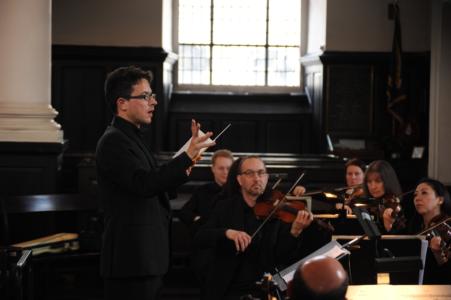
The Keld ensemble is drawn from a group of professional string players, teachers and orchestral players, who are individually based mostly in London, the South East of England and as far afield as Germany. The ensemble was spawned around 2010 at a reunion in Swaledale, hence the name. For the last decade some of the group of colleagues have come together a few times a year to perform concerts as a small string orchestra. The co-founder and general convener of the group is freelance violinist and educationalist, Jonathan Acton who introduced tonight’s concert. On this occasion the 18 players were conducted by Neil Carlson who’s principle career is as an oboist. They are regular visitors to Buxton and the Fringe in particular.
The 2nd gig at the Pump Room opened with Jean Sibelius’ ‘Andante Festivo’. The impassioned writing provided a powerful opening to the concert and the reverberant acoustic of the Pump Room is an ideal setting for this well balanced 18 piece string orchestra. Throughout the concert, we heard some awe-inspiring tuttis with superbly expressive playing.
After the Finnish influence, the Keld played works by Norwegian Edvard Grieg, hence the concert’s subtitle ‘Nordic Landscapes’. Grieg’s two instrumental ‘Elegiac Melodies’ from the suite, ‘Wounded heart’ and ‘Last spring’ are well known evocative romantic pieces. An ideal medium to showcase the rich texture of violas and cellos, indeed beautifully played this evening. The ‘Holberg Suite’ which followed has likewise been adopted into the wider public domain, extracts from the five cameo sections being featured widely as themes for TV period dramas and adverts. Mention has to be made of the subtle underpinning of the rhythmic movements by the understated double bass played delicately by Simon Wood. The andante was enhanced by the sweet melodious lead violins lead by Jonathan Acton producing a feast of rich string sonority. The final movement has a recurring lively hornpipe feel announced on Jonathan’s violin and with the tune cleverly reflected on viola, which was just as virtuosic in the hands of Geoff Irwin. The reflective section in the minor key gave way to the broad ensemble playing with the ‘Holberg’ theme passage punctuating the proceedings and lastly drawing the piece to a glorious close.
After the interval the string orchestra was joined by clarinettist Sarah Williamson who, as yesterday’s reviewer pointed out, is heralded by an extensive and widely acclaimed CV reflecting a remarkable successful performing career. Expectations were therefore raised very high for a landmark performance. She chose to perform a familiar piece both loved and hated by aspiring students of the clarinet who will have agonised over the sinister ambushes of intonation in the phrasing of Gerald Finzi’s ‘Five bagatelles’. Finzi, a notable organist and choral director, wrote a few chamber works and movements of this one that normally appear on the set list of grade exams. The first movement can be especially cruel for clarinettists by including phrases combining the strong and weak notes by limitations of design that are intrinsic to the instrument. As a consequence, tonal inconsistency and strangling “across the break” can lead to some notes sounding muted in the instrument’s mid range in comparison to the fuller resonance in lower registers. To play this piece with even intonation across the range can be deceptively challenging, particularly with little room to manoeuvre as Sarah seems to be using a fairly “hard” reed. However, the more aggressive bite facilitated by the set up pays back in the faster passages as in the last movement, the ‘Fugetta’, in which Sarah’s strength lay this evening with light and accurate articulation of the impressive scale passages. This arrangement of the bagatelles by Christian Alexander is an inspired piece of accompaniment writing, a great improvement on the orinary standard piano part. The string orchestra played with great sensitivity and dynamic expression augmenting and at times upstaging the relatively simplistic solo lines, resulting overall in a most pleasing sound.
The audience were clearly appreciative of a most entertaining evening and I trust we will see another return visit to Buxton of the Keld ensemble when these accomplished musicians take their next reunion tour… at the latest in next year’s Fringe.
Brian K W Lightowler
KATE BUTCH: CHOOSE YOUR OWN CABARET - Kate Butch

No sparkly sequinned ensemble for our Kate, a long heavy denim frock fashioned out of some old second-hand charity-shop jeans is the chosen stage costume for this unusual cabaret show. But it is no less impactful than a full-on assault with a glitter gun cannon as Miss Butch commands the place with a twinkling eye, heavily rouged cheek, far-away stare and raucous throaty voice.
Part karaoke, part human juke box, part drag act, but full-on gritty cabaret, the audience get to choose which songs make up the playlist by holding up either an orange or purple card by way of a vote. And they vote on their preference of song from a series of Kate's very own "deadly sings, not sins." There's songs about Love, Lust, Regret, Dispair, Breaking-up and, of course, Death.
Flame haired Kate mimes and acts with choreography straight outta Dad's Army, with a shuffle here and a delicate twist of the trunk there, but it all fits together so well. If Ariel, Disney's Little Mermaid grew legs and breathed Buxton air, she'd be the embodiment of Kate Butch...or is that the other way around?
I'm not known to be a fan of musicals, but cabaret like this wows folk like me. If you go along to see this show, should it appear again at Fringe, and if you don't happen to like it, then it's your fault, as you will have chosen the songs!! Unlikely as that may seem!!
David Carlisle
KELD AT THE FRINGE PART 1: CHAMBER WORKS FOR STRING ENSEMBLE AND CLARINET - The Keld Ensemble
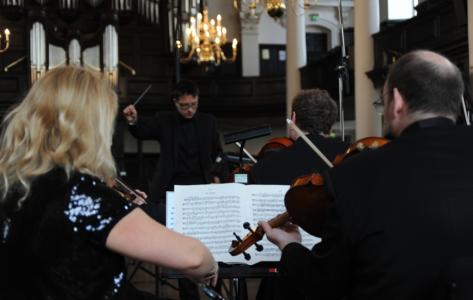
The Keld Ensemble, a most impressive 18-piece orchestra (comprising six first violins, four second violins, four violas, three cellos, one double bass) appeared in the inspirational splendour of Buxton’s 1894 Pump Room (St Anne’s Well), now the town’s visitor centre, but retaining the atmosphere, the marble pillars, stained glass windows and of course the well itself. And very important in particular to such a prestigious performance were the impressive acoustic qualities of the building, enhanced by the gentle trickling of the water in the well in between musical offerings, and the quiet lulls within the compositions themselves.
The orchestra, conducted by Neil Carlson, opened with Carl Nielsen’s ‘Little Suite opus 1’ (Praeludium, Intermezzo, Finale), continuing with Felix Mendelssohn’s ‘Sinfonia no.9’ (Grave, Allegro, Andante, Scherzo, Allegro Vivace), followed by an interval, after which Sarah Williamson on Clarinet was the featured soloist on Carl Maria von Weber’s ‘Quintet opus 34’ (Allegro, Adagio ma non troppo, Menuetto, Rondo).
The variety of tone and moods, from the dark and sonorous depths of the cellos and double bass, to the impressive upper tonal ranges of the massed choir of violins and violas, filled the room with all enveloping soundscapes, from the quiet calm of a reflective opening passage, to a light and lilting interlude, to the many strident crescendos and crashing conclusions, and the intervening trickling of the water from the well.
And the ‘icing on the cake’ was the clarinet tour de force on the concluding Weber composition from the highly acclaimed Sarah Williamson, the sheer range and magnificent technique of her performance making a fitting climax to an evening of wonderful music.
David McPhie
RETURN OF THE KILLER BEES - Will Hawthorne
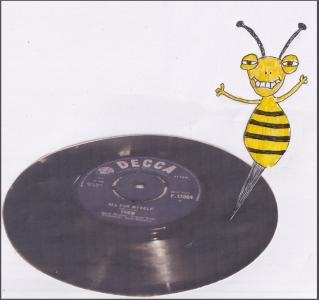
Will Hawthorne (in his solo incarnation) bucks the trend of performing covers of popular album tracks or the ‘A’ sides of popular single releases, and instead specialises in renditions of a selection of some of his favourite ‘B’ sides of popular ‘45s’ from (primarily) the Sixties and Seventies, thus avoiding an audience reaction of 'Oh no, not that hackneyed old song again'
He also treats us to a few of his own perceptive, and often wryly humorous original compositions, including one from his Rock Opera (one of his many CDs).
Strong vocals, supported by his powerfully percussive guitar style, breathed new (acoustic) life into often little remembered and seldom performed songs from the Beatles, Elvis, Marvin Gaye, the Kinks, Stones, Sam Cooke, etc., reminding us that it was always worthwhile to investigate what was on ‘the other’ side of our chosen purchases.
The exception was an ‘A’ side from ‘cartoon heavy’ rock band Sweet, a most annoying ‘glam rock’ hit from that reached No. 4 in the ‘Top Twenty’ in 1972, ‘Wig Wam Bam’, thus proving that, in the right hands, from the most unpromising clay, can be fashioned a pot of (well, almost) gold !
Will is the guitarist/vocalist with four-piece blues band ‘Responsibly Sauced’ and I believe can be found performing in various other guises too, a respected member of the ‘Buxton Mafia’ of great musicians, in a town punching way above its ‘population weight.’
The thought occurs to me that, were he to have been born 20 years earlier, then he may, had he been a prolific composer of original material, have been bracketed with such singer songwriting luminaries as Roy Harper, Al Stewart, John Martyn, etc., and would now be approaching his old age with a back catalogue of albums on the Harvest or Transatlantic labels.
Will is also appearing again (with a slightly different set list) at the Green Man Gallery at 6.00pm on Saturday, 22nd of this month, in the dying embers of this (once more) hugely successful (almost three week) Buxton Festival Fringe extravaganza.
David McPhie
WALKING ON SUNSHINE - Buxton Community Choir
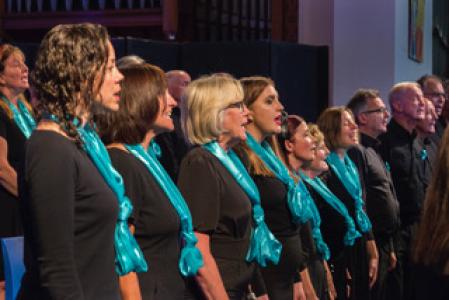
There was a buzz of excitement as an almost capacity audience waited for the show to start. And this was a show in the true sense of the word with the choir singing with gusto from memory, slick technical support with microphones and subtle lighting effects, and everything running seamlessly between introductions and performances.
The 50-strong choir shared their love of singing and the style of repertoire. This comprises popular songs from the '60s onwards with perennials such as ‘Somethin’ stupid’; ‘Hallelujah’ and ‘Mamma Mia’ and included ‘You Raise Me Up’ and ‘Mr Blue Sky’. All were arrangements for choir singing harmony and all voices were secure in their parts. It was good to hear some strong unison singing and melody shared between voices. Some arrangements worked better than others - ‘Our House’ maybe being one of the less successful ones, although the choir coped well with the changes of key. However, ‘It’s raining men’ brought the house down with the sopranos' choreographed movement and rain cape props.
Conductor Chris Blackshaw also acted as compere and mentioned that for their Fringe performance this year, solo items would be performed by members of the choir rather than invited guests, as last year. This surely shows the confidence he has generated in the choir for individuals have the self-assurance to take a solo stance. The use of microphones certainly helps to project voices and they were used for solo phrases within choir pieces as well as actual solo items. Solo numbers included ‘Memory’; ‘The rose’; ‘La Mer’ and ‘O mio babino caro’ with among the duets, ‘Top of the World’; a comic rendition of ‘’Bright Side of Life’ and a delightful unaccompanied rendition of ‘Amazing Grace’. The choir also performed an ‘a cappella’ piece, ‘Sway’, which showed the choir's grasp of singing in harmony. Perhaps this is an aspect of choral singing which could be developed further to give more variety in repertoire. For other numbers the choir and soloists were ably accompanied by Wendy Byrne.
‘Skyfall’ theme with the lyrics ‘This is the end’ was the closing number, but we all knew there would be an encore as the title of the concert was ‘Walking on sunshine’ – an uplifting conclusion considering the weather we’ve been treated to recently!
This is a choir worth listening too – watch out for future performances. Rumours are that the next Fringe performance Friday 21 July is nearly sold out!
Carol Bowns
A CHAMBER CORNUCOPIA - Cheshire Chamber Collective
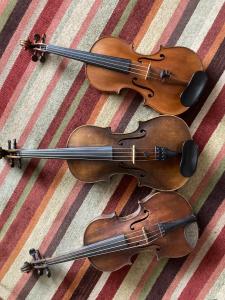
The intriguing title of tonight’s show, symbolising a plentiful amount of goodies, became a reality as did the significance of the description ‘Cheshire Chamber Collective’. The 11 members of tonight’s band are drawn from a cohort of enthusiastic musicians operating in East Cheshire who come together to make music from time to time. We are fortunate that they make regular appearances at the Fringe. All the members have studied music formally at college/university though most of the group subsequently followed professional careers in other fields whilst pursuing their music at a high level in the amateur world of local orchestras and chamber ensembles. Surely this is a compromise with by far the best work/life balance, enabling them to indulge in and reap the rewards of music-making at the same time as having a fulfilling and certainly more lucrative career than if they had tried to eke a meagre living out of professional music.
The concert opened after a display of warming up on stage with random clarinet noises not to be confused with the actual first piece. The Wind Quintet written in 1953 by Hungarian composer, Endre Szervansky is a tricky work demanding constant communication amongst the players whilst showcasing leading parts for each instrument. The wind quintet in the limelight comprised Anna Shipton (flute), Emma Tennant (clarinet), Lindsay Kershaw (oboe), Alex Kane (bassoon) and Jen Woodward (French Horn). They has been playing regularly together for some time and it would be unfair to single out a particular star as every member of the quintet was in complete control in the driving seat of their respective instrument. There were several highlights of virtuosity in each part seamlessly executed.
For the next item, the stage was then repopulated by a string sextet to play a contemporary arrangement (2020) by German composer Martin Gerigk of Vaughan Williams’ emotive work, ‘Lark Ascending’. The solo violin played by Nicola Bright opens with spectacular arpeggiated figures over the full range of the instrument, notably at the very top of the E string. Supposedly evoking the flight and song of the lark, the impressive cadenzas recurring throughout the piece were a delight. The accompanying quintet produce a rich and broad backdrop, sounding like a much larger string chorus, in part due to the skilful arrangement and voicing of the chords but mostly down to the expressive tone of the players in harmony. There were few particularly expressive phrases emerging from the viola line (Adrienne Spilsbury). On violins were Susan Harris and Alison Seller; sweet sounding cello, Anna Cowham. A sensitively played double bass was Sophie Shotton.
Strings and wind joined forces for Kerry Turner’s Rhapsody for 9 instruments, conducted and introduced by Susan Harris. This melodic piece is arranged to give prominent lines for each instrument and was beautifully played by the group. The most impressive attribute was how the musicians were effortlessly in synchrony, interacting to maintain a perfect balance of timbre.
Finally a short tango, ‘Por Una Cabeza’ arranged for the combo by Adrienne Spilsbury (on viola), an invitation to take floor for a dance. The start had feel of a Palm Court Orchestra, later capturing the atmosphere of a Viennese Coffee House. A delightful easy listening piece to put a smile on the faces of the appreciative audience with a very polished performance .
Various sub sets of the Cheshire Chamber Collective can be heard under guises such as Cheshire Sinfonia and the wind quintet as a stand alone. It is hoped that the Cheshire Chamber Collective in the line up we heard this evening will make another appearance at next year’s Fringe.
Brian K W Lightowler
MUSIC + ART - STRING QUARTETS FROM AROUND THE WORLD - Belinfante Quartet - Henrietta Hill & Friends
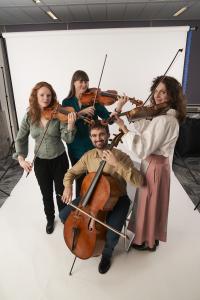
Belinfante Quartet are: Henrietta Hill, viola, from Bakewell – an ardent proponent of the Chamber Music tradition, but equally enthusiastic in her love of improvisation, the Quartet being the vehicle for the fluent extemporisations on various themes that she introduces during their performances; Olivia Scheepers, first violin – from Holland, an Oscar Wilde fan, whose injection of humour, and dramatic timing can often be discerned in her performance (her meeting with cellist Pau Marques in 2016 was the genesis of the project that was to become the Belinfante Quartet); Fiona Robertson, second violin – from Scotland, although also fluent in Italian, contributes more than the traditionally supportive role of a second violinist, providing an integral cog in the wheel of motion that drives the improvisations that form such a vibrant aspect of their performance; Pau Marques, cello – a native of the Mediterranean island of Menorca, is the foundation that underpins and propels the other three musicians, the sonorous tones of the cello providing a fulsome and empathetic counterpoint to the higher registers of the viola and violins.
The first session opened with ‘Haydn’s Opus 64 no. 6’, an example of his introduction of a Folk Music element into Chamber Music, and the quartet’s ability and familiarity with the material was quickly revealed, their easy rapport being obvious from this first number. Julian Playford’s arrangement of Arthur Wassen’s ‘Near the Church Door’ followed, another piece owing much to the Folk Tradition. And their interpretation of ‘Five Dances Griegas’ by Nikos Skalkattas and ‘IV Arkadikas’ (Greek compositions) were their first excursions into Mediterranean territory.
From relatively formal, but always immaculate interpretations, of traditional material, the performance entered more adventurous territory, and their improvisations, inspired by selected paintings from the walls of the Green Man Gallery, provided a sensory experience, the rich textures of the cello and the bowing and rhythmic plucking of the violins and viola, now frantic and neurotic, now reflective, discordant and dissonant, weaved an avant garde dance of delight through the night air.
A truly exciting and original take on the relatively unexplored territory of avant garde string instrument improvisation, the only other example I can recall being the work of African-American violin/viola player Leroy Jenkins who experimented with similar aggregations of string instruments in the 1960s and 70s and also played with Free Jazz exponents Anthony Braxton, Alice Coltrane, Don Cherry, etc.
The first session terminated with Pau Marques’ inventive arrangements of music from his native Menorca.
The second session featured Folk Dances from American-Armenian composer Komitas, Ravel’s String Quartet in F Major, more music from Menorca, an extended version of ‘Near the Church Door’, and more wonderful avant garde improvisations from the talented and adventurous Belinfante Quartet, surely destined for even greater success and critical acclaim in their future careers.
David McPhie
CLASSICAL SONG RECITAL - Anastasia Trubaieva & Eden Walker

Coming in from the unseasonal rain to the Purple Room at the United Reform Church, the audience immediately felt this was the right setting for a song recital - an intimate and inviting location. This was confirmed when the concert started with ensemble performance from soprano Anastasia Trubaieva and pianist Eden Walker who immediately created a rapport with the audience.
‘The Mermaid’ by Josef Haydn opened the recital – we instantly knew that this was a tale of luring deception from Anasatasia’s enticing visual expression. This was followed by another song ‘Fidelity’ written by Haydn when he was in London as part of his set of 12 English Canzonettas (1794).
Then came a selection of six songs by Norwegian composer Edvard Grieg. As they were sung in German. Anastasia gave short descriptions of the meaning before each song. Currently studying in Hamburg, Germany this demonstrated her love of music, language and literature.
All were sensitively accompanied by Eden Walker who also lives in Hamburg after initially studying in Denmark.
We were treated to the great depth and richness of Anastasia’s voice in the final song of the group ‘Traum’ (Dream).
‘Die verschwiegene Nachtigal’ (The hidden nightingale) was particularly delightful with voice echoing the piano imitations of the nightingale’s song.
Similar sentiments followed with ‘Waldeinsamkeit’ (Woods’ loneliness) by Max Reger with enchantment from a blackbird, this time.
Eden then played a selection from Reger’s ‘Träume am Kamin’ (Dreams by the fireside) and convinced us that we should not neglect this composer with movements that included his typical dense harmonies, but also lyrical and wistful moments and even finished on a cheerful note.
Anastasia then returned to sing a selection of traditional Ukranian songs. She explained that most are about dramatic love which suited the style of arrangement which was more like art song, following the Lieder tradition. There were elements of folk idiom with a ‘ditty dye, dye’ refrain which the audience were encouraged to clap along with.
To close the recital, Anastasia sang the Ukranian national anthem which was very moving.
Throughout the recital we were treated to great versatility and depth of expression from Anastastaia’s singing with Eden’s accomplished playing. Let us hope this partnership will return to Buxton to share their continuing performing journey.
Carol Bowns
AMERICANA FOLK AND POP - Tony Maloney and the Lonely Ponies
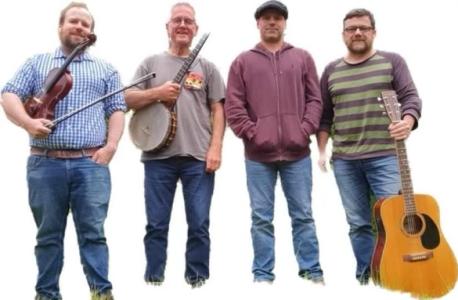
Bring on the Ponies.
The packed Dub House bar in the Old market place shows what a great idea it is for a pub to put on some music and register this as part of the Fringe. A free entry event but the bar tills were ringing, or beeping as modern tills do.
As for the Ponies, they are a familiar group around Buxton and have their repertoire well developed. They were well received by the packed audience. Being a pub environment there was coming and going through the afternoon.
The show started late due to technical issues – which never seems to happen in theatre productions but the Ponies didn’t dissapoint.
Just this one event at this Fringe but the Ponies will be around town from time to time.
Brian Kirman
MRO AT THE FRINGE - Manchester Recorder Orchestra
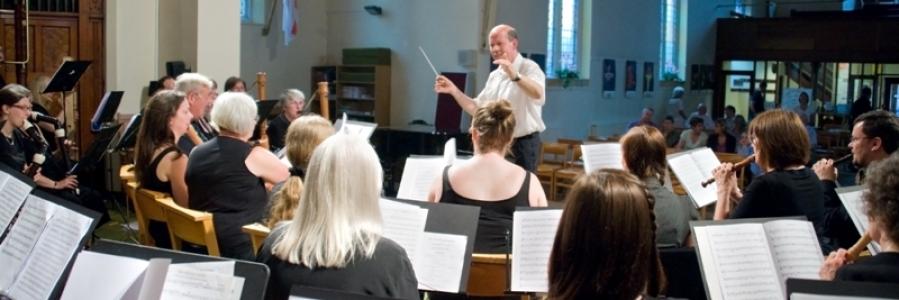
Appearing for a remarkable 22nd consecutive year at a Buxton Festival Fringe event, the MRO confounded my preconceptions of how a large recorder ensemble would sound. This was primarily due to the number and range of different sizes of the instrument: Garklein/ Piccolo, Sopranino, Soprano/ Descant, Alto, Tenor, Bass, Great Bass, Contra Bass and Sub-Great Bass. This gives the recorder orchestra format a remarkable palette of tone and timbre for such an (ostensibly, or so I formerly believed) limited genre, allowing for the exploration of many and varied musical directions, the MRO’s scheduled evening programme encompassing music from the Mediaeval era, Jazz/ Ragtime, Folk and even the Brass Band tradition.
Despite the recorder itself, in many of its different incarnations, having a long history, the first recorded example dating back to the reign of Henry IV in the 14th century, the advent of the recorder orchestra itself is a recent (20th century) development. The orchestra on this occasion numbered thirty-five, but at times can comprise a remarkable forty-five members.
The programme itself commenced with four Mediaeval tunes (arrangements by Steve Marshall) including ‘Sumer is Icumen in’ (sic), also known as the ‘Summer Canon’ or the ‘Cuckoo Song’, and is the oldest recorded musical composition, featuring six-part polyphony. As such it is ideal material for the recorder orchestra to interpret.
The second section was entitled ‘Riffs, Lament & Jazz’ (arrangements Andrew Melville), and I admit to an element of surprise that the format lent itself to a decent interpretation of the age of syncopation and improvisation. Next up was an arrangement by David Moses ,depicting ‘Rigs, Jigs and Reels’, via a selection of Irish Folk tunes, a joyous celebration of the genre. Rosemary Robinson’s five-part ‘Linden Suite’, composed on piano and harpsichord, employing jazz influenced harmony, was redolent of rural reflection and peaceful contemplation.
After the interval came possibly the most surprising selection of the performance, consisting of three compositions by Gustav Holst, ‘A Moorside Suite’, written specifically for brass bands, and arranged by conductor David Walsh, followed by Scott Joplin’s ragtime classic, ‘Gladiolus Rag’, from 1907, and arranged again by David Walsh.
The final selection, a four-part composition ‘We Are of the Stars’ by David Walsh, an evocative illustration of the evolution of the universe, provided a fitting conclusion to a most enjoyable afternoon for the assembled audience.
In summary, my abiding impression was that of an experience approximating an ethereal Palestrina Choir, conveyed instead of the massed voices of the choir, via thirty-five impressive exponents of the recorder.
David McPhie
CONCERT BRASS WITH BURBAGE BAND (BUXTON) - Burbage Band (Buxton)
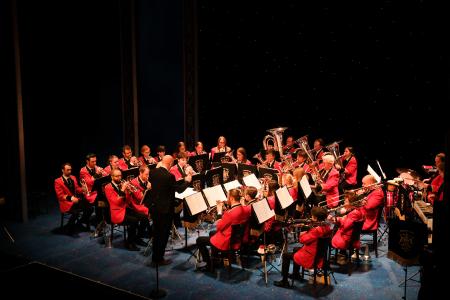
Burbage Brass Band has a fascinating history as one of the world’s oldest brass bands, dating back as far as 1861, with the subsequent addition of female membership from 1955. Formed as a village band by local quarry owner Robert Broome, their founding ethos to ‘teach music without charge, provide a healthy and constructive pastime, develop community spirit, and entertain’ remains true to this day. Under the encouraging eye of conductor Steve Critchlow, this inclusive multi-generational band competes both locally and nationally with great success, having achieved acclaimed First Section status for the past five years.
Like many of us, my only experience of our local brass bands is their transient musical march at the carnival or snippets of a Sunday concert drifting from the Pavilion Gardens bandstand. This sold-out concert at Buxton Methodist Church was next level… and then some. As the daughter of a former cornet player there is something about a brass band performance which make you feel all warm inside, but anybody expecting an evening of music reminiscent of the famous 1970s Hovis advert was in for a wonderful surprise. This concert was a perfectly considered selection of popular movie, musical and opera melodies from the stage and screen, creating a rollercoaster of emotion for the audience.
After a lovely friendly welcome by their committee team the impeccably presented band opened with ‘Circle of Life’ from the Lion King, elevated by the band recreating the atmospheric Zulu chants of the opening lyrics. Steven then went on to warmly host the evening with brief introductions to each piece, including ‘Come What May’ from Moulin Rouge, ‘Nine to Five’ and the theme from ‘Jurassic Park’.
The program was interspersed with phenomenal vocal performances by West End star Ashley Stillburn with ‘Pure Imagination’ from Charlie and the Chocolate Factory, and ‘Music of the Night’ from Phantom of the Opera. Joining Ashley was the wonderful soprano, Katy Allan, who some of you may have enjoyed at the Fringe’s ‘Dementia-Friendly Coffee Concert’ or from Burbage Brass Band’s 2019 Boxing Day concert at Buxton Opera House. Katy’s moving aria of ‘One Fine Day’ from Madame Butterfly and ‘I Could have Danced all Night’ from My Fair Lady were stunning and their duet performances of ‘You’ll Never Walk Alone’ from Carousel and ‘Somewhere’ from my favourite musical of all time West Side Story, were mesmerising. Let’s not forget though, all the while the band’s balanced accompaniment at a more gentle volume showcased their diversity and provided the perfect complement to outstanding vocals.
The band made hours of hard work and dedication look and sound completely effortless with their slick professionalism and group camaraderie. There was clear respect for each other’s individual talent which was evident in the solo performances of ‘Feed the Birds’ by Nathan Grattan (soprano cornet), ‘Concerto de Aranjuez’ by Josh Tournier (flugel horn), and ‘On My Own’ by the ‘enduring’ Mrs Laura Critchlow (tenor horn). Indeed, Steve stated his pride at both male soloists’ progression from their junior ranks and the importance of nurturing the budding talent of younger generations.
It’s near impossible for me to pick a favourite from the evening, but if I was pushed it would have to be their thrillingly dramatic version of ‘You Know My Name’ from the movie Casino Royale, it had me pinned to my seat. To say Burbage Brass Band was fantastic is an understatement, every snatched conversation during the interval was raving about the performance. Following a rousing encore of ‘Bring Me Sunshine’ (the irony of which was not lost on me following the standard Buxton weather of four seasons in one day), the final standing ovation from the audience was thoroughly deserved.
Sadly, this was the only performance at Buxton Festival Fringe 2023, but if you have been inspired to join their community either as an experienced player or total novice, get in touch with the band via their website and hopefully we’ll see you performing at one of their upcoming concerts (details also on their website). Don’t fret if you can’t wait that long, you can always buy their CD.
Burbage Brass… pure class!
Karen Wain-Pimlott
...A PROBLEM WITH CLOWNS - Egriega
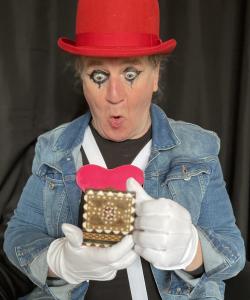
Three-times Fringe Music Award Winner, Pieter Egriega, can be relied upon to come up with something different. This year he reinvented himself as a struggling clown complete with red bowler hat, white clown make-up, red shoes, braces and with his big, soft heart stuck on his chest for all to see.
This new character, Tom Skellytom according to his publicity, is a lost soul who has also lost his voice. That means no talking but thanks to a few hints from a disembodied other party (“I’m not just a voice in your head, they can hear me too…”), he is able to discover the tools he needs to be able to sing in short bursts.
Egriega proves an expressive mime artist managing to convey life’s beautiful moments of simple happiness as well as its moments of hit-you-in-the-guts raw pain. There are difficult and uncomfortably funny moments involving unruly imaginary dogs, disobedient lifts, fiddly trinket boxes and inconveniently fragile butterflies. The otherworldy voice also dictates our responses at some points as it alternates between sympathy and ruthless condemnation for the clown on stage.
Above all though, our heartstrings are pulled when the clown picks up his guitar and begins singing. Egriega’s lyrics are a joy to behold whether he’s singing about himself: “My soul is like that circus/ Who’s going to catch me when I fall down?”, or writing an unorthodox love song: “You’re Greta Thunberg’s anger/ You’re a 90s’ dancefloor banger…” His voice let rip as he pleaded for sunshine: “Chase those clouds away/ Back to yesterday” or for dancing “like nobody’s watching me”.
Singing with both a backing track and live electric guitar was ambitious and at times I felt the balance of sound was wrong. I loved the music and its infectious beat but also felt like unplugging him on occasion, just to relish that soaring voice.
This is a show that will get you thinking as well as feeling, but it is also one where you will have a good time and quite possibly come out singing and dancing into the rain.
Stephanie Billen
AN ART SONG RECITAL: GOING TO HEAVEN! - Adrienne Pyne & Stephenie Leung
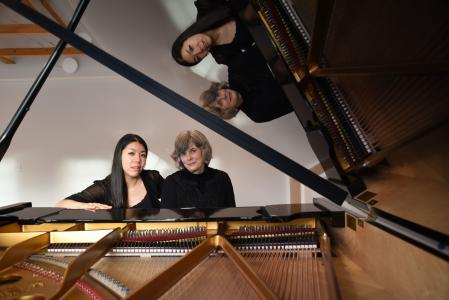
Jonathan Fisher was a last-minute (a few days) replacement for Stephenie Leung, but the transition was seamless, and the duo performed as if they were regular collaborators.
The concert opened with ‘Nature, the Greatest Mother’ the first of a twelve-part song cycle of Emily Dickinson poems set to music of Aaron Copland, one of the most respected American classical composers of the twentieth century. By incorporating popular forms of American music such as jazz and folk into his compositions, he created many innovative compositions in his ninety-year lifespan.
Adrienne Pyne's soprano range is immaculate and allows for impeccable interpretations of these twelve tales of nature, death, life and eternity. The accompaniment from Jonathan Fisher faithfully recreated the Aaron Copland score, which employs cascades of notes, explosive bursts of power chords and a crescendo of dramatic interventions, creating the tension inherent between the two participants, essential to the poetic context of the song suite.
Exposure to this mode of composition from my own background of popular music (jazz, folk, blues, etc.) which relies upon a certain amount of repetitive rhythmic propulsion, is somewhat of a ‘culture shock’, but very interesting nonetheless.
The performance moved on to an interpretation of five songs, from lyrics by Shakespeare, set to music by composer Roger Quilter, a leading exponent of the Art Song tradition. At least three of these five songs have become staples in the repertoire of the English folk song tradition, performed at folk clubs throughout the country, and indeed the interpretation by the duo was more conventional in nature and structure, as compared to the more formal interpretation of the Dickinson/ Copland presentation.
They encored to a rapturous reception, with an intermezzo by Brahms, influenced by a Scottish folk song, thus emphasising further the cross-cultural interchange between classical and popular musical culture.
An entertaining and educational (for me at least) afternoon at the (ever-stimulating) Buxton Fringe.
David McPhie
CLASSICAL GUITAR JONATHAN PRAG - Jonathan Prag
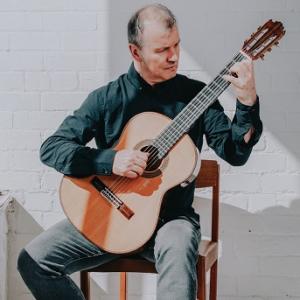
In the impressive setting of this Buxton church, framed from behind by the magnificent stained glass windows, Jonathan Prag opened the recital with ‘Capricho Catalan’ by Isaac Albeniz, which was actually composed on the piano, and influenced by Spanish folk music. The performance continued with the J.S. Bach ‘Cello Suite No. 1, Prelude and Allemande”, originally composed for cello.
A change of direction for two traditional Scottish folk tunes, ‘Isein Bhoidhich’, a lilting, reflective refrain, and ‘Staten Island’, derived from a lively hornpipe, followed by two compositions (‘Lob der Tranen’ and ‘Standchen’) from Schubert, who, remarkably, was too poor to own his own piano until his later years.
Next, from South America, combining Uruguayan and African influences, two preludes from ‘Cincinnati Preludios’ by Maximo Diego Pujol, and from Spain, with gypsy overtones, ‘Danza Espalola’, originally composed on piano by Enrique Granados (arranged by Llobet).
Finally, for a much-deserved encore, we were treated to a Bosnian folk tune, ‘Snijeg Je Pao Na Drvece’, translated as ‘Snow Has Fallen On Trees.’
The acoustics in this church are excellent and Jonathan’s faultless technique and beautiful tone on his Manuel Contreras Double Top Premium acoustic guitar provided the audience with a most enjoyable experience.
David McPhie
BEETHOVEN, GLIERE AND A TEATIME TANGO - Miles2 String Duo
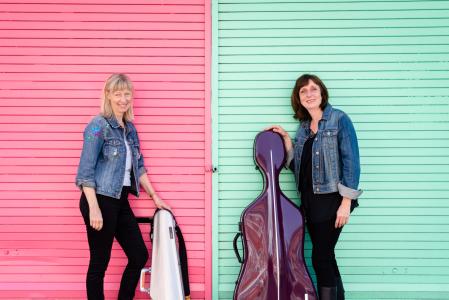
On a damp Friday afternoon, a gem emerged with the entrancing performance of Miles2 String Duo. Jacqui and Claire both pursue busy professional careers in orchestral performing and teaching. Individually the Miles sisters have impressive CVs including appearances in high places. With their pedigree one shouldn’t be surprised that the technique of both ladies was impeccable. After playing together in childhood, their careers have taken them in different directions however now they come together to create chamber music in duet.
This afternoon’s programme was wide-ranging, getting off to a cracking start with a Beethoven duet. Both ladies are clearly in full command of their instruments with clean articulation whilst pulling out a rich tone on long notes. A lovely, broad, clear tone from the cello must be mostly due to Claire’s sonorous and expressive playing but also helped by using a particularly resonant instrument, worth what I’m sure has been a substantial investment.
'Huit morceaux’ is by Glière, a composer from Kiev, when it was part of Russia in the 1870s. The 8 movements form short sketches in differing styles showcasing two part writing at its best. The arrangement skilfully throws the melody between the instrumental parts and duo develop the idea as a musical conversation. The andante pieces give the players plenty of scope for expressive interpretation, and they grasp the many opportunities, wringing the emotion out of the music. The interaction between the two instruments, particularly on the intricate sections is very accurately played as is the running passages in the busy last piece neatly rounding off the set.
Jacqui’s arrangement of Mascagni’s melodious intermezzo could have sounded a bit thin as a duo as the very familiar interpretations often involve big string sections of a symphony orchestra. It is potentially dangerous ground for a solo violin, full of pitfalls in clarity and tuning, and nowhere to hide. Jacqui made it all sound quite effortless as if nothing could possibly go wrong. The counterpoint was very effective and voicing of the arrangement gave all the information for a rich sound thus rendering a bigger band superfluous.
The ‘Habanera’ by Jeremy Cohen is an delightful, light-hearted piece combining the traditional Cuban dance rhythm with some sections with a lively ragtime feel. Some lovely touches put in by both musicians interacting with melody and rhythm; pity it came to an end as I could have easily listened to the duo’s rendition several times over.
An arrangement by Boston Symphony cellist Maki Kubota of Piazzolla’s Libertango was the ideal medium to show not only the crisp technique of both players but their aptitude for playing together as the piece becomes more intricate.
To rapturous acclaim from the appreciative audience, as an encore they played the more familiar tune of the “Carmen” habanera, obviously in familiar territory for the duo.
The duetting bar is set very high by Jacqui and Claire’s superb performance. I was pleased to learn there are plans to promote more chamber concerts from Miles2, initially either in Oxford, the hometown of Jacqui or Manchester, Claire’s base. A partnership to look out for and I hope we will hear the duo again at a venue in Buxton perhaps with a return visit to the Fringe if not before.
Brian K W Lightowler
MUSIC & MYTH - Jon Pickard (HarpGuitar)
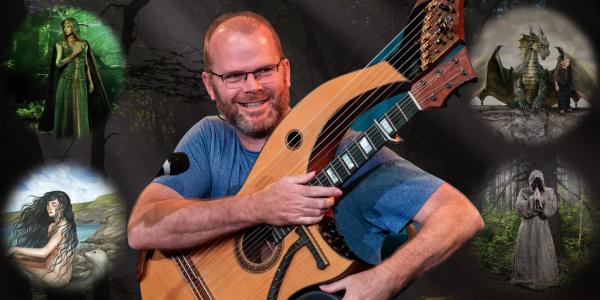
This is a gem of a show. Arriving beforehand I was greeted by the performer, Jon Picard and a small group of attendees who had seen him at last year’s Fringe. The omens looked good. I’d been drawn in by the show’s theme – Music and Myth, but I wasn’t anticipating learning so much in the process.
Jon hails from Somerset and has been a professional musician from the age of sixteen. He had brought two instruments with him – both harp-guitars. To be honest I had never heard of this instrument before or seen one. They look and sound amazing.
The show starts with a fifteen-minute introduction on the history of the harp-guitar accompanied by slides. Jon’s enthusiasm for the instrument shines through. He then works his way through a programme featuring nine different pieces with a short intermission. The show is billed as lasting an hour, but do allow a little extra time.
Prior to each piece played, Jon gives a short background to the myth connected with it. This was so interesting and gives each piece an extra resonance. He has also carefully created a montage of images and film that is projected onto the screen behind him as he plays. Together with the history of the piece and the music itself it makes for a magical experience.
Of the nine pieces played six are original compositions. All of them were simply beautiful. If you enjoy Celtic harp or music that has an almost ethereal quality, then this show is an absolute must. Jon captures the essence of each story perfectly.
This show deserves a larger audience. Jon has three more shows planned before the end of this year’s Fringe and I would really recommend you book on to see and hear it, first hand. I left with a smile on my face and a CD in my pocket and like others before me, I will return to see him again if he returns to the Fringe once more.
April Irwin
JOE BAYLISS: FRAGILE - Joe Bayliss
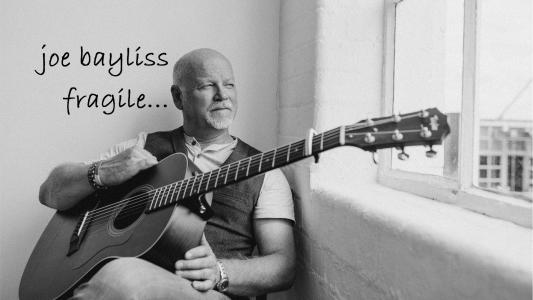
Joe Bayliss's performance this evening took place at the lovely Green Pavilion cafe.
The show was calming and atmospheric, with the sunlight shining through the window and all set against a backdrop of the Slopes. The setting was perfectly accompanied by Joe's songs and stories full of nostalgia, love and loss. His performance was deeply personal and thought-provoking. Joe played songs from his new album, Fragile; of course we all went home with a copy of it. The CD will be the perfect soundtrack for long summer car journeys!
All the songs were written from the heart, intertwined with humour, which all members of the audience were able to laugh along with and enjoy.
I would highly recommend Joe's show for a brilliant Buxton Fringe musical experience! His next show is on the 14th and the 15th of July at 7-8pm at the Green Pavilion Cafe. Don't forget a cup of tea and piece of cake to complement the performance and the coffee shop atmosphere perfectly!
Alice Featherstone
RISE AGAIN! - Four Tell
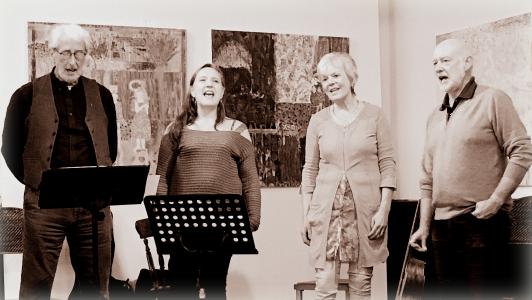
Four Tell performed a variety of contemporary and traditional folk music. The musicians took turns to sing and play, featuring the following instruments: Ian Bevan (guitar), Sarah Owens (whistle and tenor guitar), Carol Bowns (recorder) and Ian Bowns (guitar and acoustic bass).
Their first song was the traditional Macedonian “Shto mi e milo” which had an orthodox choral feel featuring Sarah, Ian and Carol Bowns. Next came “Little Pot Stove” by Harry Robertson as covered by Nic Jones, featuring Ian Bevan and Ian Bowns, the latter on lead vocals. The band then performed “Thrift” by Karine Polwart; this “Spell Song” featured Carol and Sarah with Ian Bowns on backing vocals. Carol and Sarah then sang the traditional “Blackbirds and Thrushes” with Ian Bevan on guitar. Next followed the instrumental “Si Beg, Si Mor” by the blind Irish harpist O'Carolan with Ian Bowns on guitar and Sarah Owens on whistle.
Two songs about the search for the North West passage followed, the traditional “Lord Franklin/Franklin's Lament” and “North West Passage” by Stan Rogers. Ian Bevan sang and played guitar for the first one, as covered by John Renbourn. Ian Bowns sang the second one acapella. Both songs painted a vivid picture of the struggle and dangers involved.
Carol and Sarah sang Ophelia’s song, the traditional “How should I my true love know”, their version following one by the Silly Sisters. The next song was the traditional “10,000 Miles” featuring Ian Bowns, Sarah Owens and Ian Bevan. Sarah Owens then sang the childhood story recounted in “Proper Sort of Gardener” by Maggie Holland, with Ian Bevan on guitar. This was followed by “Briar & the rose” by Tom Waits, performed acapella by Carol, Sarah and Ian Bevan.
Sarah Owens sang and played tenor guitar on “Lullaby” by Kate Rusby, Ian Bevan also playing guitar. Next Ian Bevan played guitar, whilst Sarah Owens and Ian Bevan sang “Wings” by Brian Bedford. Lastly Four Tell sang “John Ball” by Sydney Carter acapella.
The hour-long concert was very enjoyable. The audience often knew the songs and joined in on the chorus. Ian Bevan’s excellent low bass voice featured in some of the songs. Please note, for their performance on the 14th July, Ian Bevan will not be present, so the programme will be different from the one described above.
John Hare
RESPONSIBLY SAUCED (ALMOST) UNPLUGGED - Responsibly Sauced
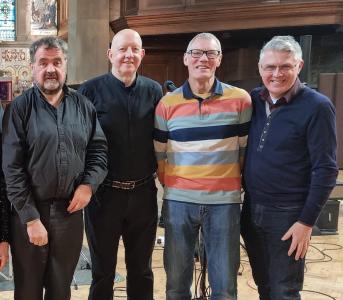
Responsibly Sauced, performed a semi acoustic set of Blues and Rock songs. The musicians played the following instruments: Will Hawthorne (guitar and lead vocals), Eric Culbert (cajon), Stuart Bootle (piano) and Adrian Sherwood (bass and backing vocals). Will played solos on most songs with Stuart and Adrian providing other solo passages. Most of the songs were covers except two which were original songs written by Will Hawthorne.
The set opened with the blues “Little Sister” as covered by Elvis Presley and Ry Cooder. Next was another blues “Mary had a little lamb” written by Buddy Guy and covered by Stevie Ray Vaughan. This was followed by Will’s original song “Bigger Gun”, a lively song that highlighted guitar and piano. The band then performed “Every day is a winding road” by Sheryl Crow. As usual Will sang lead but Adrian provided backing vocals. Featured instruments included piano, guitar and bass.
The band then played the slow blues “Love in vain” by Robert Johnson, in a style reminiscent of the Rolling Stones. Next was the blues “Nobody knows you when you are down and out” by Bessie Smith influenced by Eric Clapton’s version. Here again guitar, piano and bass were featured. The band then played the lively “Wrong thing to do” by Tom Petty with his Mudcrutch band. The song featured guitar and piano prominently and proved popular with the audience. Adrian sang the next song “Future’s so bright” by the 80’s band Tumbuk 3, again an audience favourite.
Will resumed singing duties on the slow blues “Crossroads”, another Robert Johnson number as covered by Cream. It was followed by the Rolling Stones song “Jumping Jack Flash” and then a second Will Hawthorne original, “Barking up the wrong tree”. “Werewolves” by Warren Zevon proved another audience pleaser. The last song of the main set was the blues “As soon as I get paid” by Keb Mo. An encore was requested, when the band played “Let it be” by The Beatles. The audience again enjoyed the song, singing along with Will.
In conclusion the band’s Blues and Rock numbers proved popular with much tapping of feet and singing along. Will Hawthorne’s guitar playing was also much appreciated.
John Hare
SLOW DOWN MOTION - Laurie Agnew & Joe Brown
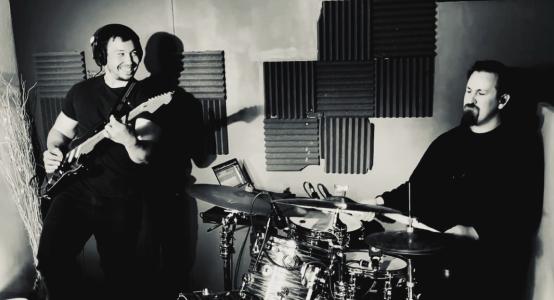
In this small, intimate venue, ten people attended this late-night performance by local guitar/drums duo ‘Slow Down Motion’.
Melodic and ambient, with ringing guitar tones, employing backing ‘loops’ of bass and extra guitars, with many ‘effects’, Laurie Agnew and Joe Brown on guitar and drums respectively, both displayed impressive techniques on a number of instrumental compositions.
However, and I say this in the spirit of best intentioned and constructive critical observation, I believe, with the obvious talent that they both possess, this format may be limiting. Comprising only guitar and drums, there’s an inherent difficulty in providing enough ‘light and shade’, maintaining audience concentration for a full hour’s session.
Opportunities for collaborations with other musicians, or an expansion of the ‘looped’ backing tracks to include other instrumentation may be a way forward, and I believe that they could well view this phase of their development as a necessary introductory path down the road to greater opportunities.
David McPhie
TRAVEL THESE WAYS - Kaleidoscope Choir
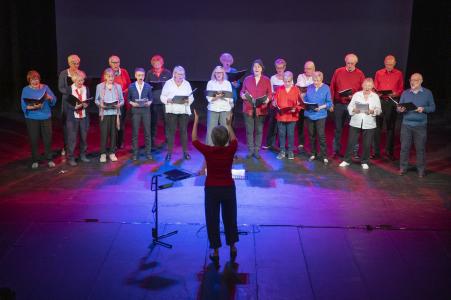
Kaleidoscope Choir is an activity run by Platform 3, an outreach initiative of the Buxton Opera House and Buxton International Festival to encourage engagement with the arts. The main aim of the choir is to have fun singing together and they certainly met that aim in last night's concert.
They are led enthusiastically by Carol Bowns and loosely based on the theme of travel, they sung a mix of hymns, folk songs and songs from the shows.
The high point for this reviewer were the three songs sung a cappella, which included an excellent rendition of the traditional sea shanty, Homeward Bound. The show included a Gospel Medley led by Tom Newall and the audience needed little encouragement to join in a version of the spiritual song, Swing Low, Sweet Chariot.
Although last night’s choir numbered 24, they would welcome new members and anyone who is interested in joining should get in touch via Platform 3.
Vernon McGarey
GIFTS FROM CROWS - Gifts From Crows Trio
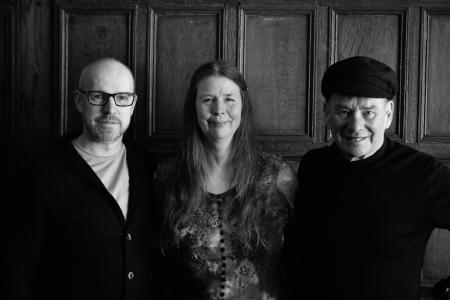
Gifts From Crows are made up of Richard Laurence, keyboards, Helen Southall, soprano and tenor saxophones and Garfield Southall, percussion.
From the opening piano chords of the first composition, ‘A Persistent Dream’, echoes of minimalist composers such as Ludovico Einaudi and Philip Glass were apparent, and (from information provided after the performance by Richard Laurence) Wim Mertens and Yann Tiersen.
Clues to the overall direction of the performance could be gleaned from the title of this composition too, as there is of course a ‘persistence’ and a hypnotic quality woven into the fabric of the music within the minimalist (both classical and avant garde) movements, emanating from America in the 1960s (Terry Riley ‘In C’ for instance) and indeed the trance strand of the ‘dance/electronica’ that emerged in the 1990s. Think also of the work of Estonian classical composer Arvo Pärt in the 1970s.
And the music also contained a ‘dreamy’ element too, injected into the music by Helen Southall on her soprano and tenor saxophones, the echo of the acoustics in the venue adding considerably to the ethereal nature of the performance. This was underpinned by Garfield Southall’s sympathetic accompaniments on his extensive array of percussive instruments, employing the techniques of the classical percussionist, accenting, interjecting and enhancing, as opposed to the snare drum/hi-hat/kick drum technique of a rhythm-based group.
All 12 compositions were short, two to four minutes mostly, aside from the penultimate ‘Seasons Suite’, a four-part evocation of autumn, winter, spring and summer, and can be heard on their three albums of material released on SoundCloud and Spotify.
Spoken word samples and a monastic chorus were included in a couple of the numbers too, and if one wished to categorise the music, then maybe ‘Ambient Minimalism out of Neoclassical’ may suffice.
A large screen above the group displayed images from film and still photography, enhancing the mood of peace and harmony, already prevalent via the ambience within the venue.
21 people were in the ‘congregation’ and gave due appreciation of both the music and the food and drink thoughtfully provided by the group.
David McPhie
DEMENTIA-FRIENDLY COFFEE CONCERT - Katy Allan
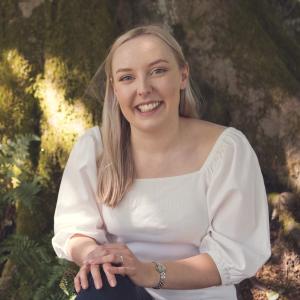
I first came across Katy Allan at Haddon Hall care home where my Mum is a resident. After serving tea there one day, she broke into song. Wow - what a voice! She was working there whilst a student but is now fully qualified and a working singer. She has never forgotten the importance of music to those living with dementia.
Now she does regularly dementia-friendly coffee mornings with song as well as going back to places such as Haddon Hall to perform to the residents.
With her beautiful voice, she performs a range of songs from classic opera to show tunes including three of her faves from Calamity Jane. We also get to hear classic pop tunes from the Beach Boys and Buddy Holly.
There were two singalongs - 'I Do Like to Be Beside the Seaside' and a bit of Morcambe and Wise with 'Bring Me Sunshine!', a very apt message. Word sheets were provided for these two songs so we could all sing along. In this world where we live there should be more Katy Allans bringing "so much joy to each brand new bright tomorrow".
She ended on 'We'll Meet Again' and I am sure we will. You can catch Katy singing with the Burbage Band on Saturday night at the Methodist Church - go along you will not be disappointed
For more information on those living with dementia see www.alzheimers.org.uk
Robert Harrison
BRAHMS QUINTET FEST - Julian Davis, Emma Tennant and Bright Quartet

In the beautiful surroundings of the acoustically-blessed United Reformed Church and with the added bonus of the restored Broadwood grand piano, Bright String Quartet and Friends presented a magical afternoon of Brahms choosing works that showcased the composer’s ability to conjure up many different musical moods.
First up was the Brahms Piano Quintet in F minor Op 34. Pianist Julian Davis introduced it explaining how it was written when the composer was in his early 30s. He apparently had three goes at getting it right, being influenced by the frankly critical opinions of friends such as Clara Schumann. From the swaying, romantic Andante to the exhilarating gallop of the Scherzo, this was a work full of emotion and drama expertly played by the Bright String Quartet of Nicola Bright (violin), Susan Harris (violin), Adrienne Spilsbury (viola) and Anna Cowham (violoncello), their instruments conversing effortlessly with Julian Davis’s sensitive piano.
After a tea break for everyone to catch their breath, clarinetist Emma Tennant introduced the Brahms Clarinet Quintet in B minor Op 115, written much later in his life. She explained how in this work the clarinet was an equal partner with the strings. This was a work that could lull us into a false security with sunny melodies before plunging us into the minor key and something much more unsettling. I enjoyed the way Emma’s clarinet playing seemed to ripple and soar in the Adagio and the way she relished the ensemble playing whilst also enjoying the moments when her clear, beautiful notes pierced through the strings.
Fascinating programme notes revealed the backgrounds of the players including violinist Susan Harris’s recent new venture singing and performing live on the electric guitar - surely a Fringe show in the making here! Half of these highly experienced musicians have a medical background suggesting that contrary to popular belief, music not laughter may be the best medicine. I certainly found this concert a very restorative experience on a rainy afternoon. The Bright String Quartet can also be heard as part of A Chamber Cornucopia with Cheshire Chamber Collective at the URC on July 17th at 8.15pm promising a varied repertoire including a strings version of The Lark Ascending all rounded off with a tango!
Stephanie Billen
TELLYFULL OF SONGS PART 2 (WITH COMMERCIAL BREAKS) - Fred Up
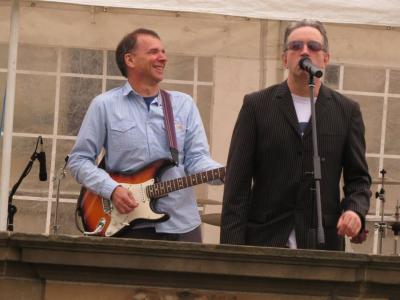
I am always wary of seeing something tagged as “part 2” when I haven’t seen part one. In this case, I’m glad I risked it.
A deliberately muffed introduction sets the tone as the performers present themselves with a confident catchphrase (which of course we never hear again) and make sure the audience know they are part of the show.
And what a show it is. Part singalong, part pub quiz, and plenty of comedy as the duo play off each other and the audience, forget the answers to their own quiz questions, introduce props and amend the script on-the-fly. As the title suggests the songs are themes from TV shows, interspersed with advertising jingles.
I want to tell you about those I particularly enjoyed, but as guessing them is half the fun I also don’t want to spoil it. Let’s just say there’s a great variety, from a TV Western I remember fondly from childhood to sitcoms and science fiction, all performed with great enthusiasm by Fred Up. They remind me of a village pub act, in the best way. The audience are strangers to each other when they enter the theatre but by the end of the show I felt like we were all friends. It’s that kind of experience.
One warning: if you remember the jingles of the 1980s you will not leave this performance without an ear worm stuck in your head – if you are old enough you know the one I mean!
Now, when can I see part 3?
Caroline Marks
QUIET FIRE - Basin Street Jazz and Blues
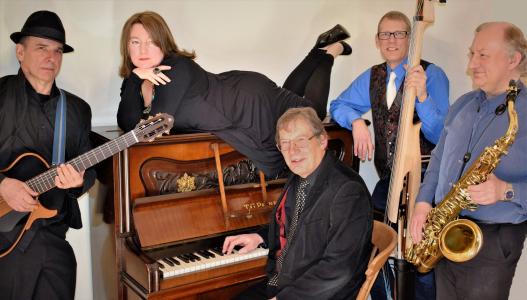
An audience of 34 people attended this concert at the Green Man Gallery on the evening of Sunday 9th July. Jules M Scott (vocals), Brian Lightowler (piano and accordion), Mike Dale (saxophones, flute, clarinet), Fred Rolland (guitar) and Adrian Sherwood (electric upright bass) are Basin Street.
It’s often said that 'a prophet is rarely appreciated in his/her/their home town', and whilst this is not entirely true of Buxton’s own Basin Street Jazz and Blues Band (they do have a good following in the town), I do believe there is still room for a greater appreciation of them in the area, and a sense of pride that we have a group of musicians and entertainers who have something quite special to offer.
One thing that sets them apart is that they have a relatively unusual line-up for a jazz outfit. An accordion is not a regular instrument in a jazz band, but Brian’s chosen instrument is particularly distinctive, and prominent on the French-influenced numbers in their repertoire, adding considerable ‘colour’ and character to the arrangements.
Another great advantage is the versatility of Mike Dale on both alto and tenor saxes, clarinet and flute, with a definite Sydney Bechet touch on the clarinet.
Fred (Stringbender Exraordinaire) Rolland exhibits a muscular style on guitar, that is particularly suited to the blues numbers in the set, and some of his explosive interjections have a Steve Cropper feel to them (Steve Cropper, Booker T and the MGs, and composer of most of the soul classics on the iconic Stax Label, in addition to providing the rhythmic propulsion on his guitar).
Adrian Sherwood provides the ‘foundation’ on his bass, particularly essential in the absence of a drummer, again, another unusual thing for a jazz/ blues band, but one which goes unnoticed due to the percussive ingredient provided by Adrian on bass and Fred on guitar.
Another unusual, and refreshing, element is the different and eclectic choice of material, featuring standards like ‘Sway’ and ‘Nature Boy’, two Nina Simone tunes, some of their speciality French-flavoured material, a couple of bossa nova/ Latin-tinged instrumentals, Ray Noble’s ‘Harlem Nocturne’ and the traditional ‘Basin Street Blues’, first made famous by Louis Armstrong.
It’s unusual for a band to cover so many stylistic bases, and they do just that, but where they excel is in their French-influenced material, featuring the accordion, and the blues songs, both the 12-bar variety, and the blues-inflected jazz material.
In effect, we get three bands for the price of one, a French Jazz Quintet, a Blues Band, and an unconventional Jazz Band.
Not to mention the almost rock ‘n’ roll treatment of Billie Holiday’s ‘Now or Never,’ somewhat reminiscent of Louis Jordan or Bill Haley, with Mike Dale coming on like King Curtis, Brian Lightowler doing a Jerry Lee Lewis, and Fred Rolland sounding uncannily like Bill Haley guitarist Franny Beecher.
Oh, wait, have I forgotten something, or more to the point, someone?
No, of course I haven’t, and if you were present then you would be well aware that supremely impressive chanteuse Jules M Scott was in fine form on all of those diverse genres, covered in one entertaining hour of fine music.
Returning to the theme of ‘appreciation of what we have on our own doorstep', or in our own locality, what we do have in Jules is not someone who can be judged in concert with other ‘local’ jazz/ blues vocalists, but who is manifestly ready to be compared to the very best that this country (at least) has to offer.
I cannot fault her phrasing, her timing, her improvisation around a melody, her range, the versatility of her approach to the diverse styles (blues, jazz, the French-style material in the repertoire). All is achieved without discernible undue effort, or the artificial ‘straining’ for dramatic effect so typical of some (particularly) blues singers. And that is the mark of a consummate professional, and moreover, a true ‘natural’.
I have seen (‘live’) nearly all of the jazz ‘greats’, from Louis to Duke, vocalists including Ella and Sarah (no surnames necessary I’m sure) and possessed recordings of all the notable female jazz singers who were comfortable with the blues, including Billie Holiday, Dinah Washington, Peggy Lee, etc, and so I can recognise talent that approaches the standards set by such iconic forerunners of the genre, and Jules is perfectly capable of singing the songs they performed, without fear of any detrimental comparison whatsoever.
And should she successfully move on to write and perform her own self-penned songs, then who knows what her horizons may be!
David McPhie
A POSITIVE MENTAL HEALTH SONGBOOK - Darren Poyzer

'A Positive Mental Health Songbook', is a heartening performance filled with songs and stories that will make you smile. Darren spoke about how personal music is and how each of us have our own taste in music that helps us during difficult times. As a war veteran with experience of struggling with his mental health, Darren has found entertaining a therapeutic way to try to 'keep his heart happy'!
I enjoyed the honesty of the show, with Darren sharing that it 'feels so human to make mistakes in performances'. He cared for the enjoyment of the audience and showed empathy for anyone that has also struggled with their mental health. I would highly recommend Darren's entertaining show for anyone who would enjoy a performance from a talented musician with inspirational, funny and hopeful stories to tell.
We were lucky enough to have a brilliant encore to finish off the evening, with a sing-along song that would be the 'first song of the rest of your life'.
Darren performs his fantastic show again at Underground at the Clubhouse venue on the 16th July at 10pm-11pm and 21th July at 4pm-5pm. This is definitely not a show to miss.
Alice Featherstone
CLARKSDALE PRESENTS ANNIE DUGGAN LIVE IN CONCERT - Annie Duggan and Rob Hines
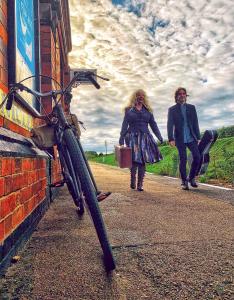
The pairing of powerhouse vocalist Annie Duggan with exceptional guitarist Rob Hines is a match made in … well, possibly Clarksdale Mississippi (as mentioned in their pre-show publicity) or Nashville Tennessee, or the backwoods of Alabama. Take your pick, but the ‘roots’ of their music undoubtedly originate from the diverse strands of blues, country, folk and jazz that combine in the melting pot of ‘Americana’.
To classify their music as one or other of these genres would be to do them a disservice, as their mastery of each and all is palpably plain to witness in their performance.
Annie opened with an acappella version of ‘You Are My Sunshine’, owing more to the Ray Charles version than the Andy Williams, her voice both powerful and expressive, encompassing the grit and growl of the blues, the more mellow tones of country music, and the subtlety of the jazz stylists. She employs all of these devices within her repertoire, including standard classics from those genres, and original compositions from the pen of erstwhile collaborator Colin Granger.
The empathy between Annie and guitarist Rob Hines is all encompassing, and his impressive technique allows him to employ both rhythmic subtlety and impressive interjectory extemporisations in his accompaniments. His solo excursions were truly amazing, the powerful propulsive drive of the country bluesman in tandem with the Scotty Moore ‘Sun Sound’ Elvis era rockabilly ‘licks’, and an occasional hint of Spanish flamenco, a truly amazing combination of influences finding a home in his one man guitar ‘orchestra’!
All of those elements combined in their version of Robert Johnson’s ‘Crossroads’, a result of our pre show conversation about the pre-eminent country blues singer.
Annie and Rob will be making another appearance at the Green Man Gallery in a fortnight’s time, on Friday 21st July.
David McPhie
BELIEVE TOUR 2023 - Annette Gregory
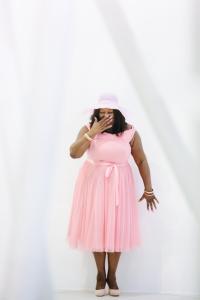
Annette Gregory, with sidemen John McDonald on piano and Joe Kessell on double bass played a set of sophisticated jazz, featuring ‘standards’ by such as Cole Porter, Jerome Kern, Lerner and Loewe, etc., Annette stating that her primary influence was Ella Fitzgerald. Echoes in her performance of other ‘greats’ who come to mind are Billie Holiday, Sarah Vaughan and Anita O’Day.
Her singing style is light, delicate and reflective, featuring an impeccable sense of timing, and her original compositions were just as interesting in a different way, one a tribute to her mother. Her early influences, from her parents and their circle of friends, were reggae, soul and country, and her performances in the early stages of her career featured ‘Lovers Rock’, a romantic style of reggae that had its roots in the London communities of the early generation of West Indian immigrants in the 1950s. This wasn’t however apparent until she introduced a Bob Marley number late on in her set. Pianist John McDonald was an ideal accompanist, his economic, but intuitively empathetic style perfectly complementing Annette’s vocals, and the double bass of Joe Kessell adding the necessary rhythmic propulsion to underpin and propel the music in the right direction.
Both sidemen were accomplished soloists, but if I have one (minor) criticism it is that the ‘accepted wisdom’ of small group jazz performances is that the double bass (or bass guitarist in some circumstances) must often have equal soloing space to the other instrumentalists. This is by no means an individual criticism of last night’s performance, but a broad observation that the improvisational scope of the instrument doesn’t lend itself to such prolific exposure.
Annette herself has her own jazz club in the West Midlands, is well respected within the British jazz community, and her music is widely available on both YouTube and Spotify, in addition to her available albums.
David McPhie
LAID-BACK JAZZ BLUES - Sideways Band
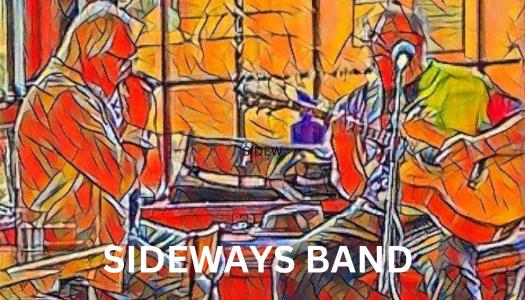
The flyer for this show by Sideways Band, describes it as laid back, relaxing and engaging. I could honestly not describe it better. The audience arriving at the Lee Wood Hotel were given the friendliest of welcomes by performers, Peter Buxton and Richard Smith. Their obvious camaraderie and banter had everyone smiling before they’d played a note.
Peter plays guitar and does vocals while Richard accompanies on the harmonica. I’m not a jazz aficionado so wasn’t entirely sure what to expect, but I needn’t have worried. Nothing about this show is stuffy. The two performers played a varied set list including tracks from Ry Cooder, Dobie Gray, Johnny Cash, Tom Waits and Van Morrison, but also included some original material too. Peter hails from Buxton, but now lives in Dorset. Despite the geographical distance he still misses the Peak and performed a beautiful song describing his longing for the area.
Peter and Richard’s enthusiasm for their material shines through. The audience really engaged with the performance, singing at points and foot tapping throughout. Peter’s guitars and vocals are spot on and the accompaniment from Richard on the harmonica really adds to the mellow and soulful quality of the tracks being played. It is no exaggeration to say, I have never heard a harmonica being played better.
I came away with a smile on my face and a newfound appreciation for laid back jazz and blues. I would encourage everyone to grab a ticket for their final performance before they head south once more.
April Irwin
ENCHANTMENT, ENJOYMENT AND ENRICHMENT - High Peak Orchestra
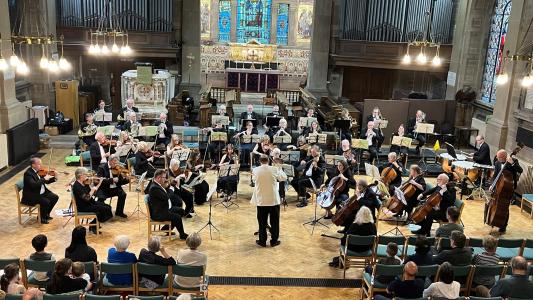
The High Peak Orchestra, based in Whaley Bridge, is well known locally for many concert performances and promoting amateur music making. The orchestra is quite at home in St John’s Church with the marvellous acoustics of the venue and they are regular contributors to the Buxton Fringe.
The concert opened with one of Anton Dvorak’s symphonic poems, ‘Water Goblin’. A detailed programme was on sale and welcome indeed to have a precis of the folk tale said to be the inspiration behind the music. As the piece unfolds having an idea of the plot represented enhances the imagery. After the first storm episode when the tempo was emphasised in percussion the occasional straggler in the band fell into line and the moods were well portrayed. The next calmer section with the flute and horn interaction was particularly expressive and the succeeding furious sections, supposedly the goblin’s anger, giving way to calm and towards the end the images of pathos and despair. All the sections of the orchestra had their contribution to the drama - all very effective in interpreting the essence of the piece.
To close the first half, Piano Concerto No. 2 in F major, Op. 102, composed in 1957 by Dimitri Shostakovich for his 19 year old son Maxim, who premiered the piece during his graduation concert at the Moscow Conservatoire..
Performing the piano part tonight was Rose McLachlan, in her final year at RNCM. Her catalogue of public performances including this same concerto with BBC concert orchestra four years ago, and successes in numerous competitions sounds impressive. As progeny of a family of musical professionals, for the young exposed to the public domain, falling short of perfection is not contemplated. Rose’s elder brother performed with HPO in Buxton a couple of years ago and it is tempting, though unfair, to note how the “next” McLachlan compares. She presents an endearing charm and to her great credit her performance of tonight’s work felt sympathetic to the overall ensemble resulting in a non-confrontational performance with all on stage pulling to the same goal. The opening themes of the 1st movement were clear and appropriately balanced with the feel of the accompaniment. The virtuosic sections were well articulated and for my money not marred by the often heard egotistic helter-skelter barrage of unilateral nonsense.
The second movement (annotated with typo in the programme) starts with some wonderfully rich string ensemble writing beautifully played by the section. The measured melodic piano entries cutting through were lovely. A little tasteful development of the tune, it was disappointing for it to end. The last movement is technically harder to play but in Rose makes it sound easy, a sign that she’s on top of the task (if one is ever entitled to say that).
At the interval we were reminded that the surplus of tonight’s concert goes to assist the work of ‘Zink’, a Buxton charity offering crisis assistance, practical and emotional support to people in poverty for a variety of reasons. Refreshments for the audience were provided by volunteers from Zink.
The music of the second half was Saint-Saëns 3rd (Organ) Symphony, commissioned in London in 1886. It’s a great piece capturing a mood of glorious triumph. At the organ was Simon Mercer, a much respected music teacher and professional organist. Simon played very well, living up to his high reputation as an accomplished performer. The registrations deployed were complimentary to the orchestra creating the unique atmosphere of grandeur that only the ‘king of instruments’ can offer. The Organ Symphony obviously includes the organ in the instrumental line up but more as a regular component of the band than as a concerto soloist. The first movement after opening chords is down to the string sections. The busy running passages which can easily fall into a mush were tonight clearly articulated and balanced. The woodwind ensemble entry was likewise very clear. In the second section the organ comes in and particularly the bass pipes add the next dimension to the soundscape, filling the church with subtle power but just restrained enough to avoid drowning out the rest of the orchestra. A feeling of ‘calm before the storm’ is soothingly maintained to the end of the movement. The slick development of the theme mostly in the woodwind in the next movement was well blended and executed with some quite tricky passages. After the organ returns to fill the back of the church once again there are some bold and virtuosic interjections from the piano expertly played (Adam Taylor). Towards the final climax of the piece the lower strings, cellos and double bass (James Banks) did a great feat of dexterity with the tricky running passages.
The HPO’s conductor David Chatwin has held the baton for 6 years and his tenure has been associated with a noticeable and substantial improvement in musical discipline and ensemble playing. There are clearly some very accomplished players in the ranks and it would be difficult to single out any particular person. The individual members seem to be in command of their instruments and any weak links there may be were not apparent in tonight’s concert. The overall performance is a credit to all concerned resulting in a most enjoyable concert exceeding the sentiments implied by the title of the show. I expect and hope that the High Peak Orchestra will be active for the foreseeable future.
Brian K W Lightowler
LA DOLCE VITA: ITALIANS HOME AND AWAY - Mr Simpson's Little Consort
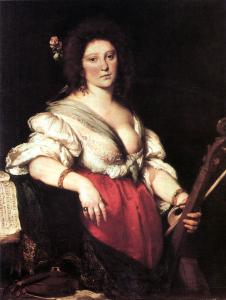
Musical audiences are now well aware of ‘Early Music’ and interpretations on historical instruments such as viol, theorbo, recorder and lute but it is a rare treat to hear live ensemble performances, so a warm welcome back to Mr Simpson’s Little Consort.
The name of the ensemble pays homage to Christopher Simpson who was a virtuoso viol player who composed a piece called ‘Little Consort’ and comprises of Cate McKee (soprano, keyboard), Sue Snell (recorders, viols), Dawn Johnston (lute, theorbo) and Piers Snell (bass viol, violin).
The programme entitled ‘La dolce vita: Italians home and away’ explored Italian music and its influence of on composers in other parts of Europe.
A glance through the programme includes familiar names such as Purcell, Dowland and Monteverdi. The extensive programme enlightened on less well-known composers and how Italian musicians, composers and styles have influenced English music from the court of Henry VIII through to Charles II.
The concert started with two contrasting love songs by Alfonso Ferrabosco and established the link concert theme with an Italian musician and composer working in the court of Elisabeth I.
The pure soprano voice with lute accompaniment was one of the many variations of instrumentation used for this concert. In contrast Monteverdi’s Confitebor was a dramatic tour de force for the singer interspersed with instrumental sections for violin and viol with echo conversations between violin and singer in the final ‘Amen’.
We also heard purely instrumental pieces such as the Sonata by Cima with virtuosic recorder playing supported by bass viol and organ.
There was a solo item on theorbo, Chaccone by Piccini, introduced with an amusing quote by the composer, who claimed to have invented the instrument.
This is a very accomplished ensemble who obviously enjoy making music together. They are also very knowledgeable about their repertoire and the audience might have benefitted from more verbal introductions to the selection of repertoire. As the concert overran slightly, it might be worth considering programming fewer items to accommodate tuning or including a short interval.
This was an engaging and illuminating concert and I would recommend the trip to Eyam to hear the repeat performance in the historical surroundings of Eyam Church Sunday 9 July 15:00 – 16:15.
Carol Bowns
BIG BAND'S BACK IN TOWN - High Peak Big Band
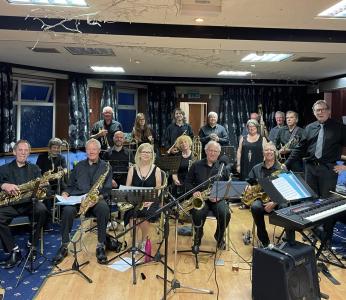
It was with some trepidation that I entered the Conservative Club and joined an assembled full house of 67 people, as a couple of non-professional big bands that I had formerly seen were a distinct disappointment. But I need not have been concerned, as this particular (18-piece) swing band did indeed justify its name, as the prerequisite for all bands of this nature should be that they ‘swing,’ and they ‘shout’ their musical credentials with unbridled enthusiasm and panache, and indeed they did just that.
We were treated to a journey through 24 numbers from the Great American Songbook with Hoagy Carmichael, Lerner and Loewe, Harold Arlen, George Gershwin, VictorYoung, W.C. Handy (an opening St. Louis Blues being a significant portent of things to come) featuring prominently. Half of the tunes containing vocals, shared by the two resident chanteuses, Jules M. Scott and Julia Peacock, both with their own differing styles, but each possessing an innate mastery of the art of stamping their individuality on a tune, and applying their own very special phrasing and syncopation to the song.
Particularly impressive were Jules’ interpretations of Billie Holiday’s ‘God Bless the Child’ and Gershwin’s ‘Summertime’, and Julia’s (Billy Joel composition) ‘New York State of Mind’ and Anthony Newley’s ‘Feeling Good’. Not to be upstaged in defence of a male representation however, trumpeter Mike Mason gave us a rousing vocal version of ‘It’s Only a Paper Moon.’
Despite conductor/pianist Brian Lightowler’s modesty about the band that he’s been leading for 15 years of its 30-year existence, and the undoubted mixed ability levels inevitable within the composition of any amateur musical aggregation, if there were any serious ‘cracks’ in the fabric of the band, then they were well hidden. And his arrangements of such, albeit familiar, material provide the impetus for a propulsive rhythm section which drives and underpins the ‘front line’ instrumental arrangements as interpreted by the four trumpet, four trombone, four saxophone line-up, providing a context for some impressive soloing within the arrangements.
I can only proffer one criticism of the evening, and that is the absence of a Duke Ellington number, but in the circumstances that is maybe somewhat churlish, given the overall enjoyment of experiencing a big band in full cry on (virtually) my own doorstep !
The composition of the band is as follows :-
Saxes: 1st Alto Kay North, 2nd Alto Rod McKay, 1st tenor Mike Dale, baritone Jean Stewart
Trombones: 1st trom Dan Peake, 2nd trom Peter Boxall, 3rd trom Simon Brocklehurst, Bass trom Hazel Jolliffe
Trumpets: 1st trumpet Mike Mason, 2nd trumpet Sam Pollard (some very well constructed solos & fiercely accurate in reading and tuning), 3rd trumpet Ron Darlington (a veteran of the art), 4th trumpet Graham Jeff
Rhythm: Dble bass David Cliffe (author of a number of local books), Guitar Fred Rolland, Drums Dave Attwood, Piano and conductor Brian Lightowler
Vocals: Jules M. Scott, Julia Peacock
Front of house John Lomax
David McPhie
HANNAH BRINE WITH CLIVE GREGSON - Hannah Brine
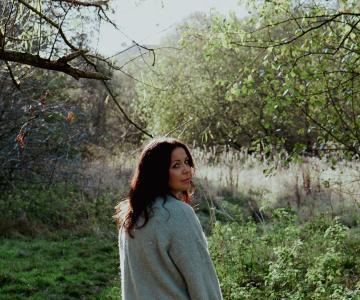
The main focus of Hannah’s songwriting is personal relationships, her own and those she observes. There were songs of current love, past love, separation and consolation. All co-written, most often with Michael Garvin or Ed Blunt, they contain melodic hooks and some beautiful turns of phrase.
The restrained amplification showed the best of Hannah’s voice, Clive’s playing and the Green Man Gallery’s acoustics. There was an intimate feel to the evening, which was mostly just one acoustic guitar and one voice. The first four songs (Picture Book, Funny the Ones, When You Know You Know and When You Don’t Speak) followed that pattern, moving through different rhythm and feelings. They then switched to electric guitar (Clive) and piano (Hannah) for two songs. One, Goodbye London, describes Hannah’s departure, leaving London for the High Peak last year. My one small suggestion for the repeat performance is to consider using a microphone for Hannah’s vocals on those two songs, as I’m not sure her voice carried to both ends of the L-shaped audience in the Gallery.
The sole cover of the evening was Joni Mitchell’s Big Yellow Taxi, when the audience responded well to Hannah’s request to sing along on the chorus.
Clive sang his new song, I Take You With Me, which shows he’s still adding significantly to his considerable body of work. His playing complemented Hannah’s voice and songs, always adding to the song without ever dominating. Hannah has a lovely voice and sings with great expression, and Clive maintained that as the centre of each song, embellishing subtly and creatively. Both performers struck up a great rapport with the audience, no doubt helped by the presence of a few members of a choir that Hannah runs locally.
My favourite moments were Spirit of the Singers, written with Daisy Chute, a skilful tribute to popular female singer-songwriters, and the intended final number Don’t Dim Your Light.
A large first night audience showed their enjoyment throughout, and the desire for an encore went well beyond the usual ritual.
Finally, extra kudos to Hannah for dressing appropriately in her orange dress for her first Fringe performance.
If you’re looking for an intimate evening of well-crafted, personal songs, sung beautifully and skilfully accompanied, I suggest you get your tickets as soon as you can for the only repeat performance on 22nd July – word gets around.
Ian Bowns
SUMMER BLISS - VociVoices
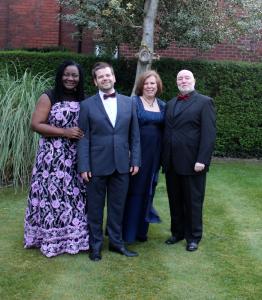
VociVoices quartet features the phenomenal vocals of Elizabeth Ambrose and Margaret Ferguson (sopranos), Eric Cymbir (tenor) and David Cane (baritone), accompanied by prizewinning pianist Jonathan Ellis. Amongst their multiple individual worldwide accolades, they also sing with the City of Manchester Opera Company.
A warm welcome was extended to the audience on an equally warm and sunny Buxton afternoon. We were led in gently with the weather appropriate swing numbers ‘Too Darn Hot’, ‘Blue Skies’ and ‘Come Fly with Me’. Then the vaulted ceiling of St. Mary’s Church could just about contain their powerhouse voices when we were virtually pinned to back of our pews by Margaret and Eric singing ‘Love Divine! All Love Excelling’, followed by a beautiful group arrangement of ‘The Lord is My Shepherd’.
The brief introductions to each piece along with the obvious affection and camaraderie between them really engaged the whole audience. Romantic numbers ‘Love is a Many Splendored Thing’, Gershwin’s 1927 ‘S'Wonderful’, and the more contemporary ‘When You Believe’ were followed by opera’s ‘Crudel! Perche Finora’ from The Marriage of Figaro and one of my favourites of the afternoon ‘Pa-pa-gena! Pa-pa-Geno!' from The Magic Flute. The latter, performed by David and Elizabeth, really appealed to the younger members of the audience and had us all smiling. Finally their rousing encore of another familiar Gershwin piece, ‘I Got Rhythm’ got everybody ready to go back out into the glorious sunshine.
It doesn’t matter if you don’t know your Tosca from your Madame Butterfly, all you need is a general appreciation of the operatic style. Even with my limited knowledge of the genre, I still had a tear in my eye throughout as it was impossible not to be moved by their beautiful voices and harmonies. What VociVoices do so well is to make it really accessible to all by putting their operatic twist on a broad range of music. Sadly there are no more performances at Buxton Fringe Festival 2023, so make sure you see them in at our next Fringe in 2024.
Karen Wain-Pimlott
SUSANNA AND GUY CLARK: A STORY OF TURBULENT LOVE - Dimestore Dirtbags and friends
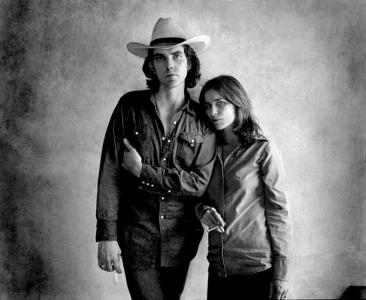
The world of Country music is so immense that there are bound to be outstanding artistes that somehow pass by your radar. For this reviewer, Susanna and Guy Clark come into that category. No more, however, thanks to the efforts of the Dimestore Dirtboys with this affectionate and informative tribute.
The Dirtboys comprise husband and wife team Randy Horton and Sara McConnell supplemented on this occasion by a number of highly capable guest musicians. The band were effectively unplugged which enhanced the intimacy of the performance. Randy proved to be a genial host as he led us through the sometimes rocky life episodes of Guy and Susanna, played out through a tasteful selection of their songs, mainly written by Guy. There was also effective use of slides to illustrate the music.
In all, there were 5 guest musicians, with especially tasteful harmonica playing by Roy Page and some outstanding vocal contributions from Matt Hill. Matt apart, some of the singing was a little insecure, but it was always heartfelt and sincere. Many of the songs were indeed outstanding. Apparently Guy received a belated Grammy for ‘My Favourite Picture of You’ which was inspired by a photograph of his late wife that Randy shared with the audience. ‘Don’t Let the Sunshine Fool You’ was reprised for an encore that was enthusiastically requested.
In all, a genuinely feel good evening which inspired the reviewer to want to know more about the work of Guy and Susanna, which would have been the ultimate intention of the show.
Fred Rolland
SIREN - Lili la Scala
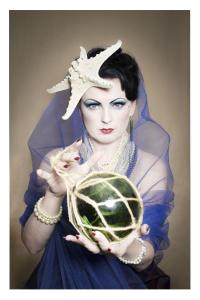
It’s been a long time since Buxton Fringe was graced by the presence of Lili La Scala. Since 2012, when she was last here, garlanded by a Fringe Award for Vocal Performance, cabaret singer Lili has found her plans altered by relationship breakdown, childbirth and Covid. Now, finally, she returns, with none of her powers diminished and a reminder of why she made such an impact last time around.
Dressed like a 1940s ‘His Girl Friday’, in tight-fitting suit, headscarf and vertiginous heels, Lili combines wryly comic, self-deprecating links with superb vocal dexterity. Hers is a voice of bell-like purity, her diction crystal clear, and a command of her instrument that makes her able to tackle songs from operatic works by Fauré to torch songs from the likes of Tim Buckley and Tom Waits. Siren is built around the theme of the sea, and each of her songs brings to life that most capricious of elements, and man’s relationship with it.
Accompanied by pianist Tom Miller, Lili’s repertoire is both warm and challenging, throwing in new compositions written for her, including an epic musical interpretation of Longfellow’s narrative poem, The Wreck of the Hesperus, which displays the skill of both performers.
Siren is a show that deserves as broad an audience as possible, a show that would appeal to both Fringe audiences and Festival culture-vultures, and Lili La Scala remains a class act. It’s great to have her back.
Robbie Carnegie
RIK ROBERTS: GUITAR MAESTRO - Rik Roberts
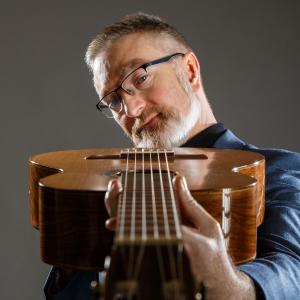
You wouldn’t think that Elvis Presley’s hit “Its All Right Mama” from 1954 would be fertile ground for a virtuoso guitar interpretation but then you haven’t heard Rik Roberts roaming freely adding layers of complexity while leaving the melody (mostly) intact.
This is Rik’s style. Elvis came later but his opening number set the tone with a rendition of counter melodies and riffs that seemed tantalisingly familiar but only after he simplified his variations could we recognise and sing-along with ‘West Virginia”.
His style is jazz-like and could have been improvised except that it was all so precisely played. Rik traversed a range of genres taking in: The Beatles, The Eagles’ Hotel California, some folk tunes including ‘The Leaving of Liverpool’, Spanish, Brazilian and African music. He also played a composition based on bird-song.
Rik’s stage presence is quiet and unassuming and he apologised for not being much of a singer asking us to help out, which we readily did. At one point we maintained a beat while he switched instruments.
His finale, at first unrecognisable through the layers of interpretation, was eventually simplified so we could sing along to ‘Amazing Grace”.
High quality music which was varied and performed impeccably.
One more performance on 9th July.
Brian Kirman
RARE OCCASION IN CONCERT - Rare Occasion

An audience of forty people were indeed treated to a rare occasion on the opening night of Buxton’s Festival Fringe, as Judy Dunlop and her two accompanists are unfortunately very rarely to be seen together in concert.
One would not however be aware of this on the evidence of their performance. The vocal harmonies and the instrumental empathy displayed by guitarist Jon Scaife and violinist Nigel Corbett in backing Judy Dunlops’ impeccable vocal interpretations of traditional British and American folk songs, musical adaptations of poetry by Anna Alma-Tadema, William Blake, Charles Causley and Rabindranath Tagore, and her own self-penned compositions, comprising the material for an evening of music that transcended the description of ‘Folk Music.’
Judy is nonetheless highly respected amongst the folk music community, witness these tributes from luminaries such as ..
Simon Nicol ('It’s always been my greatest pleasure and treat to work with, and listen to Judy') ..
Maggie Boyle ('Judy’s voice is absolutely stunning, and she is as moving a performer as you’re ever likely to see') ..
Hannah James ('For me, Judy has the perfect combination of vocal control, soulful delivery, and beautiful stage presence. She is a truly inspiring performer')
Praise indeed, and she is in my opinion a worthy successor to the long line of female British folk artists from Anne Briggs through Norma Waterson, to Maddy Prior, June Tabor and Sandy Denny. Testament to this is her recorded work with members of Fairport Convention, The Albion Band, Show of Hands, and collaborations with Mick Ryan, Steve Marsh and of course Ashley Hutchings, with whom she recorded the magnificent album ‘Sway With Me’, a celebration of our traditional woodlands.
Jon Scaife is an accomplished guitarist, having performed throughout Britain, the USA and Canada, and is often heard on BBC radio. He arranges much of the repertoire of ‘Rare Occasion.’
Nigel Corbett was a violinist with the Sheffield Symphony and Sheffield Philharmonic orchestras from 1974 – 1980, and has played in a number of ceilidh and concert bands, including Euro-Roots Band Prego, and John Tams’ Stalking Horses, where he met Lester Simpson.
They finished their set with a much deserved encore of the old favourite ‘The Wild Rover’, but set to a refreshingly new tune.
Their combination of musical prowess, stage presence and relaxed humour combined to give the audience a rare treat on this ‘Rare Occasion.’
And they will be appearing again next year at High Peak Bookstore and Cafe ‘Bookstock Festival’ on the evening of Friday April 19th.
David McPhie
CLUB ACOUSTIC AT THE FRINGE - Club Acoustic

While the Opera House is the famed jewel in Buxton’s cultural crown there are many lower key venues and events which make Buxton such a great place to live. One stalwart is Club Acoustic which meets every fortnight throughout the year, upstairs in the Old Club House. Club Acoustic, which has been running since 1999, claims to be “Not really a club and not always acoustic, but always about music”. Their events are also always free, as was their fringe showing on Wednesday night.
Their normal ‘club’ nights have multiple artistes performing acoustically a single song each, but for this special fringe event we had club regulars playing extended sets to a packed audience. And on this occasion there was amplification.
The Club House was packed with an appreciative and enthusiastic audience. It may not have been intended but there was a theme of getting younger as the evening progressed; beginning with the Good Ole Boys (perhaps it’s unkind to point out; more ‘ole’ than ‘boys’) who played classic blues and jazz from a century ago. They were followed by Danielle and Emma each playing guitar, who performed familiar standards and a couple of Danielle’s own compositions. Compere Toni Boden held things together with great enthusiasm.
For the finale we had Doug Torr who is a capable guitarist and has a quiet singing voice but the amplification on this occasion brought out a stage presence which is not normally on show. He was accompanied by some of the other performers, changing with each song. One guest, the well known local guitarist Will Hawthorne, appeared briefly as support but was much underused through the evening. Doug's final song had all of the performers on stage accompanying him.
If there is a complaint then it would be that there was a lack of ‘edge’ to the music. Songs were familiar and safe choices but, in justification, the audience loved it; even demanding encores.
Club Acoustic only has this one showing in the fringe but when the Old Club House space clears and the festival fades the Club will be back in August plugging away and continuing the free live music tradition in Buxton.
Check out their website:
http://www.club-acoustic.org.uk/
No membership required and always free.
Brian Kirman



